Text
She Sells Seashells By the Seashore (2021)
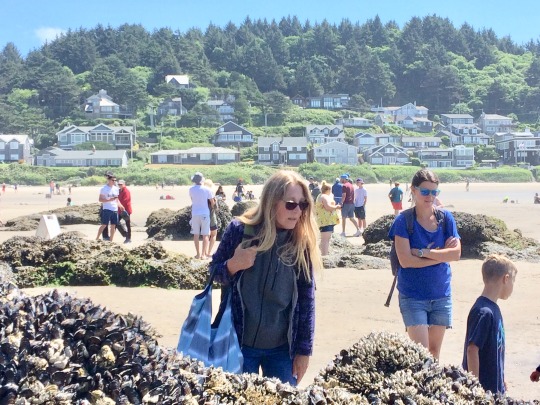
For some reason, unknown to mankind,
my mom, on her last full day of life—
before she laid down on a hospital bed—
wanted to buy some starfish
in-person, carefully selected
by her own hands.
No, not the bleached white skeletal varieties
of starfish, but the chalky pastel-
colored ones, almost looking
like candies from Columbia
Chocolates, the kitschy kind:
the only ones
one would find
at a place called
Marsh’s Free Museum.
So we drove the 45-minutes
across the span of the Astoria-
Megler Bridge—past the river-docked
container ships—past Fort Columbia,
where we would take the dogs for a run
—past the lobster-pot Christmas tree
in downtown Ilwaco.
When we arrived, my father and younger
brother scattered, on the hunt
for something other than starfish.
I held my mom by the arm
while she puffed on her cigarette.
So dizzy she was that I did more
than just hold out my arm: I held her up,
taking some weight off her feet,
as she lurched around the small store
looking for the colorful starfish.
She found a bin of them, arranged in piles at waist-high.
They all looked the same to me, but to my mom,
each one had a special, unique story to tell.
She squinted and leaned into the shelf,
picking up and examining each one,
feeling its heft, rubbing her fingers
over the bumpy nodules,
before finally selecting one, two, and three of ‘em
by plopping them into her basket.
If life is in the details,
I now understand.
I never thought of my mom as a discriminating shell collector
but then I thought about it:
In Romania, I watched as she shuffled along the shore of the Black Sea,
eyes craned down, picking up the strange and smelly shells
littering the beach. I sat back on the sand, and I watched her very carefully.
It was two years before her passing, but somehow I knew.
In her golden age, my mom collected the most worthy oyster shells
from the discarded piles outside of the seafood processing plants
on the Long Beach Peninsula. She’d bleach them clean,
buff them smooth, and paint glitter over them,
giving them a shine they never had
when they skulked about the bay,
keeping their traps shut.
I could overdramatize, and say my mom was buying these starfish
for her own burial, or to decorate her own headstone, or something like that.
But the truth cuts closer to the heart:
She was doing some last minute Christmas shopping
for some more loved ones on her list.
The starfish were for her granddaughter, Marisol.
She would buy a ship-in-a-bottle for her grandson, Mateo.
To my own daughter, she mailed a toy logging truck, made out of wood.
To each one of her grandchildren, my mom sent a piece of Oregon,
the vast Pacific empire of forests, ships, and fish.
And then she retired,
to the passenger seat,
exhausted.
Even when we pulled down the road
to the beach, she was too tired to walk
to the breakers. But she watched us go instead.
My mom spent some of her life looking for seashells by the seashore.
My mom spent most of her life sending us signals of her love—
wrapped, packaged, hand-written, hand-selected.
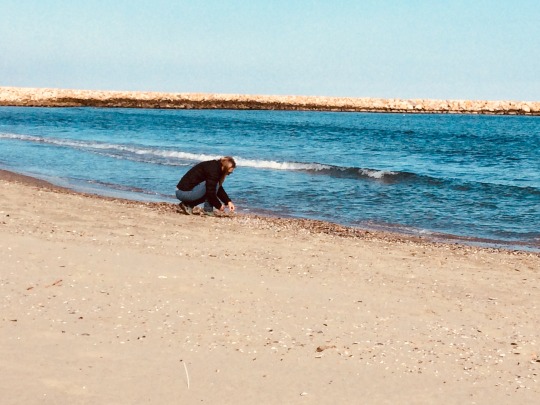
2 notes
·
View notes
Text
Mom is Love: A Chronicle of 2020
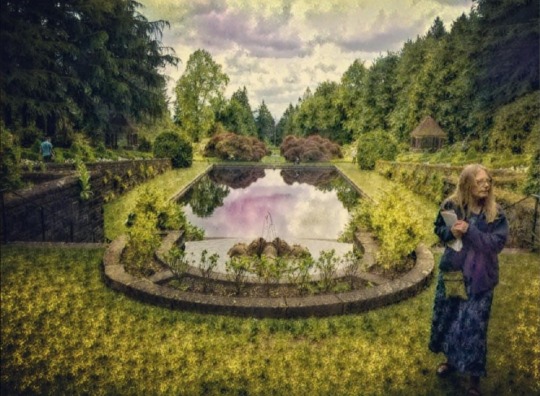
Last year I wrote, “I welcome this new decade, like a new chapter, with open arms.” I want to repeat this phrase again, because I am not sure 2020 is the kind of year one opens their arms out and fully embraces. Mostly I embraced 2020 with my butt-cheeks planted firmly on my couch, or my home office chair, waaaaayyyy too much, but for the safety and health of the collective. However, there were certainly some BIG milestones that should be noted. To be upfront, the tragic part of this year has to do with my mom, and her slow, and then fast, decline due to cancer. Her health status colored my year, adding a melancholic shade of blue to the apocalyptical events, as if the pandemic eating away at our societies was mirrored in the cancerous tumors and cells eating away at my mom’s few remaining chances for hope and joy in 2021. This, then, is the chronicle of my 2020, which very soon became, and will henceforth be known as our chronicle: the ongoing story of the Nersisyan-Adams family.
January
A little over a week into 2020 and I got a kick in the butt from Ani while I'm in the kitchen making coffee: the pregnancy test came back positive. We had a little pickle in the oven.
reeling from the loss of my sister—
this new life kickstarts the cycle of life—
or is it a rollercoaster?
That same morning we successfully applied for a civil marriage at the Bucharest City Hall. Finally all our paperwork was in order. That night I started a Google Doc called “2020 Diary” written as a letter to my unborn child. I must say that sometimes weeks would blink by without an entry, but I am happy there is a record of 2020, in words. (This dispatch is not that Diary, despite its length, I swear.)
When the 17th came, I took a personal day off work, and Ani and I hopped into an Uber to the government building, for our 5-minute ceremony and 10-minute “reception” in a side room. Our two respective witnesses, Rita and Dasha, met us there, as well as our translator. Then, out of nowhere, Ani’s brother and sister-in-law showed up minutes before it was our turn. We stood before the official as they read off precisely what we were getting ourselves into, and the translator whispered the English version into our ears, and I remember precisely zero of those words, but I wholeheartedly agreed to it in spirit.
and so our union—
spied by family witnesses—
seals our everlasting

The following weekend, we spent our “mini” honeymoon at the InterContinental Hotel in downtown Bucharest. A room with a view, a pool on the top floor, and room service! Though Ani had morning sickness and I had a fever of 102 F, we had fun gazing out at the panoramic view of our adopted city.
Towards the end of this month one of my students, who is Chinese, starts attending school wearing an N95 mask. Questions arise. Amid all the discussion, I mention the few facts I think I know to be true: that this new virus circulating is no more deadly than the flu (false). This puts the kids at ease. Later, we learn that masks should be worn by people who may suspect they are, themselves, infected. My student, who took a lot of harassment along the lines of, “If you think the air’s not safe to breathe here, don’t come to school!” may have actually been trying to prevent us all from catching the virus. (He had spent the December break back in China, after all.)
the clues are all there for us to see
but sometimes illness has to be seen
to make us believe the screens
Nearly the last day of this month, my mom drops the bombshell: She is diagnosed with ovarian cancer. She knew something was wrong for months, but didn’t go to the doctors. It doesn’t take long for Ani and I to cancel our planned wedding ceremony in Portugal, scheduled for late June. We wish to devote our energy and resources towards my mom’s health. Privately, we both are relieved at not having to keep planning this increasingly-complex destination wedding. Little did we know that this would be the first of many cancellations this year.
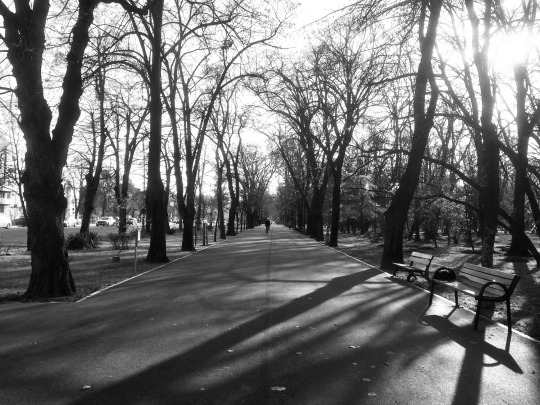
February
My mom went in for surgery early this month at OHSU hospital, in Portland, Oregon. “Dr. will save my life,” my mom wrote, via WhatsApp. The surgeon's plan was to cut out her ovaries, uterus, and the tumor, but once they got inside, it was too messy and dangerous to do much of anything. They needed to seal her back up, start chemo, and wait for the tumor to shrink a bit more. My mom was pissed that they opened her up for nothing, but relieved that she takes to the chemo well, and this regimen will go on for many months. In the meantime, I kept her updated on Ani’s pregnancy and due date. I wrote to her about our life in Romania. She wrote back:
I left my heart in Bucharest
Hope to come out
October
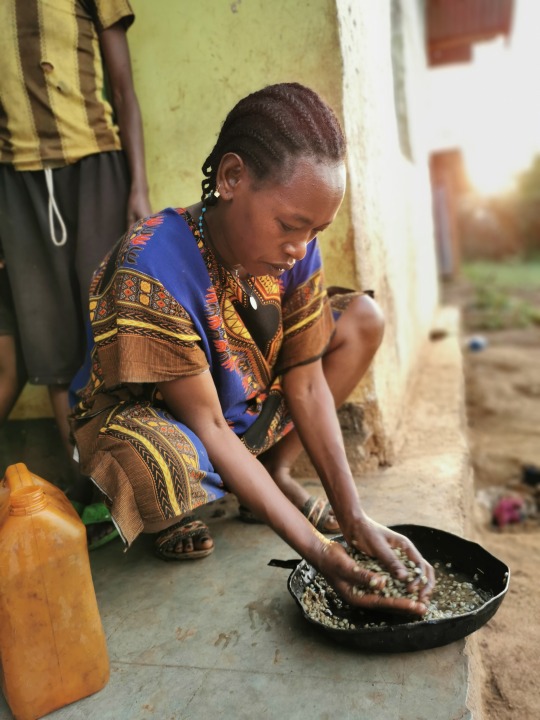
Meanwhile, five colleagues and I took a planned trip to Ethiopia for our February break. I was the de facto tour guide, since I spoke some Amharic and we were going to spend most of the time in Bonga, where I had served in the Peace Corps. We were going to do the Tourist Thing, in the place where I had once written would be manna from heaven to adventurous tourists. And, sure enough, our trip went well, and everyone got the culture shock treatment at least once in the brief time we were there.
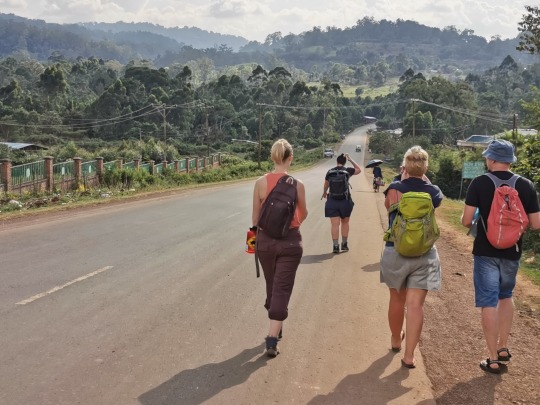
The most memorable day there was a Monday, when we must’ve walked over 20km, visiting all my old haunts around the hilltop village, eating at Meron restaurant, reuniting with some old colleagues at the college campus, visiting its new library, and then, at 4:30pm, foolishly setting out on a hike through the coffee jungle to Shappa. Nevermind that the last time I did this hike we started in the morning, and had to frequently ask directions from locals, and it was a tough, sweaty trek. My plan was to call for a contract minivan to come pick us up in Shappa (or, barring that, walk back to Bonga). Well, we didn’t reach Shappa until 8pm, when it was already pitch dark, and most everyone was settling in for the night. When six white tourists come stumbling into your small village in the middle of nowhere, guided only by the lights on their smartphones, the rumors shall fly. And fly they did.
Are they spies?!
What are they doing here?!
How much did they say they would pay that contract driver?!
The town’s elder statesman, who happened to be the local geography teacher, gave us a stern lecture as we waited for the minivan, while a crowd of 30 to 40 locals looked on. When he asked, “Where is your guide?” My colleagues all pointed at me. It felt like betrayal, but it was technically true. Apparently we needed a special guide and permit to cross through the coffee tree jungle.
so much depends
on a white piece of paper
rubber stamped in purple ink
When the minivan showed up, it was a confused pandemonium, and emotions ran high. Turns out the villagers were concerned these guys in the van might rob us, or have conspired to rob us. Bad things happen on the roads at night, or so I’ve been told. In any case, we did indeed make it safely back to our guesthouse by about 9:30pm, and we ate a dinner of granola bars and beer (because they have a bar but no restaurant at the guesthouse, naturally). We all went around the circle and spoke about one regret we had from that day. Of course, looking back, I don’t have any regrets. Hiking through the verdant green hills of Kafa in the golden hour, and then under a blanket of stars, is a memory I’ll cherish forever.

The week we return to school from February break is when the outbreaks start in Italy and elsewhere in Europe. My flight path transited through Rome airport. Had we transferred in Milan, we would have had to quarantine for two weeks, and several of my students had to do as much.
March
Ani flies to Russia for a cousin’s wedding ceremony. I cannot attend because of complications to do with renewing my passport in January, traveling to Ethiopia in February, and the fact that Russia wanted to hold onto my passport for three weeks. I simply could not abide by that. While she’s in Russia, the world starts to slam its doors shut to keep the coronavirus out. She’s only gone a week; when she left we didn’t have any concerns; by the time she returns I’m thanking our lucky stars she is back home. A week after she returns, my school closes and moves to online instruction.
there is a moment
while sitting on the couch
eyes out my window
a slow panic crawls
up my spine, this thing becomes
real: a pandemic.
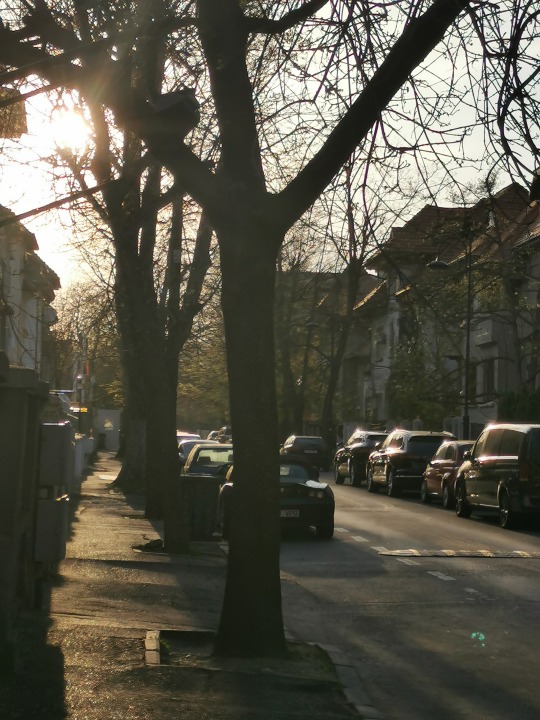
April-May-June
I think I spend the entirety of these three months staring out at the world through screens, be it my Zoom classes, or doomscrolling through the news, or likely trying, in vain, to get a refund or credit for canceled flights and hotel bookings. But, the one thing Romania’s lockdown had going for it was that, even though the parks were closed, we could all go out for a walk “for exercise,” though you just had to write yourself a note, and sign and date it, and have it on your person. And so these evening walks around our neighborhood became almost like a ritual cleansing from the screens of the day. In a way, the pandemic forced us to spend quality time with each other simply enjoying the calm before the storm of our upcoming parenthood.
Oh, and one more milestone for June: I paid off my final student loans! And became officially debt-free. (I wrote a 15-page essay on this lengthy process, and I’ll post it eventually, but the moral of my story is:
if you want to get out of debt
or live debt-free, the first step
is to move out of the United States.)
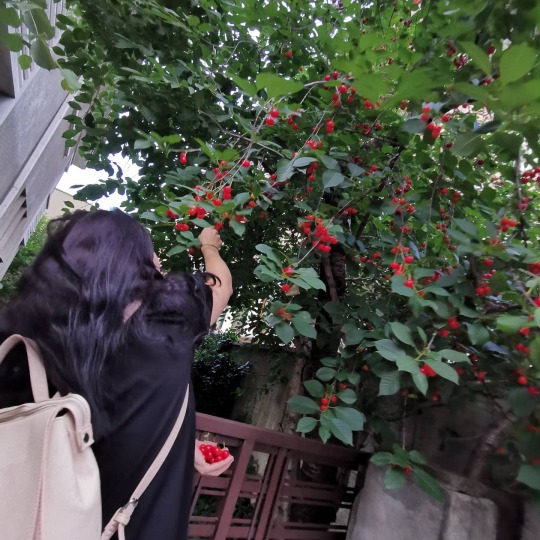
July
I had bought a ticket to the United States for this month way back at the start of February. My plan was to spend time with my mom in Oregon. But then the U.S. fumbled the ball on the pandemic, and it was getting even worse in summer, not better. I kept going back and forth. The risks versus rewards. In the end, having a wife who was within two months of her due date made the decision for me. I could not risk somehow being locked out of Romania when I had a wife who could go into labor at any moment. My mom pointed this out to me, and said, “Don’t come. Don’t risk it.” So I didn’t.
Instead, while Ani finished up her last few weeks at work before her summer leave kicked in, I took a week-long road trip with a few colleagues to Croatia. And that was glorious, mainly because Croatia was empty, and it is never empty. I got my soul’s fill of snorkeling, stand-up paddleboarding, stargazing, sun-soaking, and open-water rock climbing on the blue dream of the Adriatic Sea.
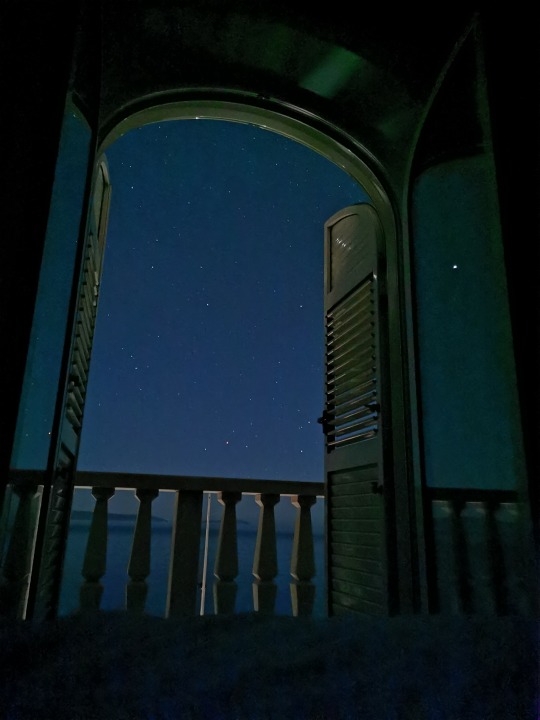
When I returned, Ani and I spent a week on the Black Sea. Our first night we pitched our tent in the wild dunes. Before you picture a romantic camp, note that we got the last remaining patch of dune that wasn’t already claimed by the wild camping masses. (The pandemic really made domestic travel in Romania more crowded than ever!) Even so, if we squinted, it felt wild. The wind was whipping so hard, we heard not a soul. The rest of the week we stayed at an Airbnb close to the beach resorts with their sun loungers. Now that was a vacation.

Also this month, my mom had her 2nd surgery attempt. It was another failure, as the “mess” did not get much better. Turns out my mom is platinum-resistant; meaning standard Carbo-Taxol chemo will not work for her; meaning there would be no way to make this cancer go away completely. One doctor’s opinion was that she had 3-6 months to live (I only learned about this information in December). Her main doctor, ever the optimist, swatted that idea away, and gave her several options, none of which included hospice. The doctor highly recommends 2 of the 6 options (really too many!) but my mom goes with another treatment — Doxil — for the simple reason that it’s one thing, not a combination of things. She begins this treatment in August, and it seems to have heavier side effects than standard chemo.
mom is the unluckiest cancer patient
in the world: nothing works
and the most rare events
seem to always happen
August
Before I have to go back to work, I take one last journey this summer. I hop a night train to a large town in the mountainous far west Romania, then a taxi up to a trailhead, and then schlep up a ridgeline in the Parang Mountains. I camp next to a small, spring-fed lake in the shadow of a lesser peak. It’s called Miju Lake, hidden away on a spur trail, and it is now part of my spirit atlas. Sure, there are a few day-trippers who stop by the lake, splash around, eat their lunch, and then leave. Otherwise I have the lake to myself.
when the surface of the lake ripples
who are you seeing: the water or the wind
why must we climb the mountain
when there is serenity by the lake
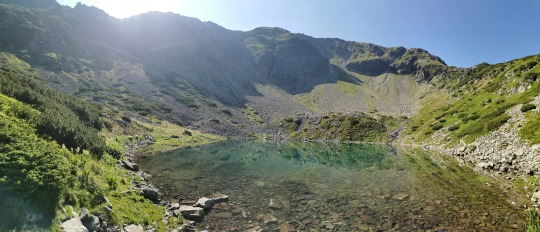
For two nights and three days I get to watch the ripples on the surface of the lake, and the hues of blue-green shift with the rising and the setting of the sun. I do spend a few hours on a day-hike to the 2nd highest peak in Romania (mostly to avoid the bulk of the day-hikers to Miju Lake) but otherwise spend my time reading poetry, thinking the thoughts, soaking the legs in the ice-cold water, and meditating on a rock overlooking the valley where the water from the lake cascades down the mountain.
if the whole world is alive
why aren’t rocks alive
One morning, I woke to the sound of rockfall. Thinking it could be a brown bear, I poked my head out of my tent, but found only a pack of chamois, the stout mountain goats of Europe, crossing the scree field.
one thinks one is alone
sitting beside a lake in the sun—
and then the wind blows

The new school year begins online, in distance learning mode. I will teach English and Humanities to the grade 8s this year. Energized by this situation, I whip together a unit called “Who Rules Over Whom?” with a study of Shakespeare’s The Tempest as well as excerpts from Aime Cesaire’s post-colonial retelling, A Tempest. This unit is paired, in Humanities class, with our history unit on the Age of Exploration and Rise of Colonization. I have many goals, though the primary one is for students to find an appreciation for Shakespeare, or for reading plays, at least, even if they do not understand the words quite yet.
While I was birthing this new unit of study, Ani prepared all August to give birth to our daughter: Mira Nehalem. And then, at the end of August, she did. On a Friday morning she hopped an Uber for the 8-minute ride to the private hospital. (I wasn’t going to be let through the doors, so there was no point in my going, and don’t worry, she wasn’t in labor.) I stayed home and taught my morning classes. In between two classes, I checked my phone, and there was a simple message from Ani: “We’re done” (and a photo of Mira sleeping in the bassinet next to her bed). Tears come on suddenly, tears of joy. It’s indescribable. When my next class starts, I announce the birth to my students.
a student notices:
Mira is like the start of Miranda—
was that intentional?
no, I swear, merely coincidence
though deep down I think of Prospero
protecting his daughter
and the coincidence may be intent.
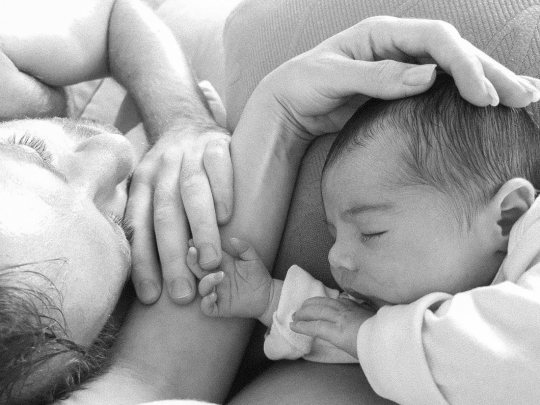
In Romania, due to COVID restrictions, mothers are allowed exactly ZERO visitors while they are giving birth and recovering from giving birth. Thus, I must wait all of Friday, Saturday, Sunday, and Monday morning to see my girls. Thankfully, a friend invites me along on a bike tour of some wineries that weekend, to take my mind and heart off of things. Still, Ani sends videos periodically that feel unreal. I forward these to my mom, and she wakes up to Mira videos, ever grateful for this lovely way to start her day.
September
The days blur together. I took one week of paternity leave that first week home with Mira. (I will spread out my allotted three weeks across the next four months.) When we get Mira home, I hold her in my arms and I can’t stop gazing intently at her face. I don’t know what to make of it, other than that this is what needs to happen for us to bond. Perhaps new fathers (and new mothers) need this psychic exchange to help code our brains in preparation for parenthood. This person, the code seems to inscribe, is your person. Remember her face. Remember what she looks like in case she ever gets lost in a crowd. You are now responsible for her. (Zap Zap Zap)
There really is a strong before and after feeling, that your life simply cannot go on as it once did. I notice that beer and wine are quicker to give me headaches, as if my body is telling me: Don’t you dare get drunk when you’ve got a baby to take care of! I notice that my fear of holding a fragile baby soon transforms into an ability to twist, turn, spin, rotate, or flip the baby into whatever position we need her to be in. I also notice that if I hold her just so, and bounce on a fitness ball, she calms down immediately, and usually will fall asleep.
I am turning into an X-Man.
A mutant.
A father.
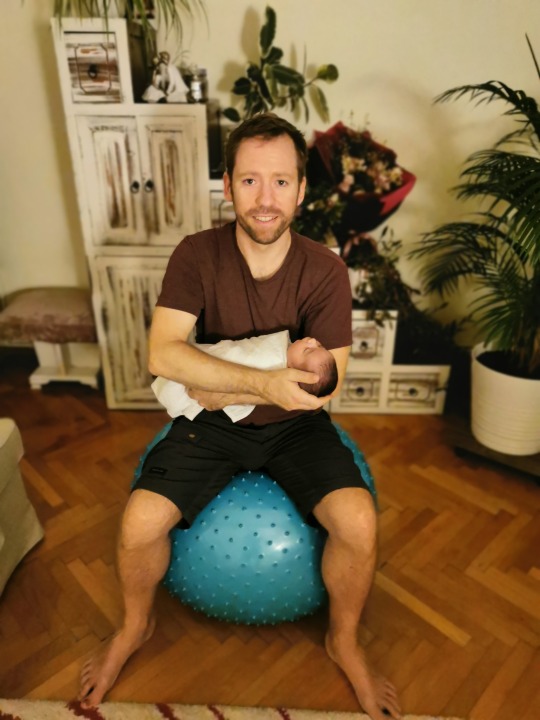
October
In early October my niece gave birth to her son on the same day as her own birthday. My mom flew down to San Diego to be with her on this special occasion, but was suffering from vertigo throughout her time there, and had to lay down most of the time. She got checked out at a clinic, though it was inconclusive. My mom believed this was one of many side effects from Doxil, the chemo drug she was taking. (Later we would look back and see that this was actually the start of the cancer’s spread to other parts of her body, in particular, her brain.)
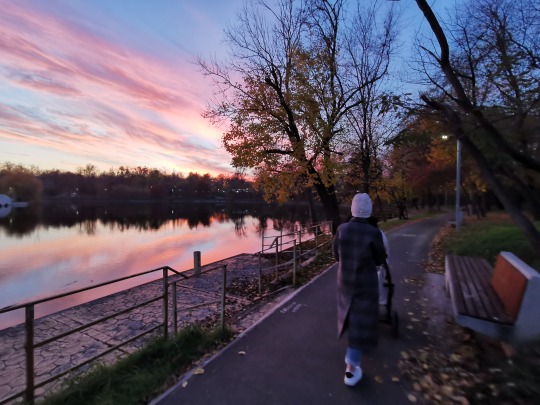
For October break, my family and I hit the road to Transylvania, to see the fall foliage in the mountains. On the way, we stopped at an outdoor restaurant for pizza. Just after pulling out of the restaurant, we hit a road hazard, bending two rims and flattening one tire. It was so bad we needed to call for a mechanic to help us, roadside, but had to wait 45 minutes on the side of a busy highway. The mechanic arrived, helped us fix our tires, and we were on our way. Mira slept through all of this, and nearly made it to our final destination two hours later before opening up in a scream/cry. We needed to pull over and feed her immediately.
at every instinct to go off
do my own thing, I stop
and think: with my family
November
This is the month when my school’s month-and-a-half-long experiment in holding classes on-campus comes to an end for the year. First, know that my school was doing its utmost to ensure that nobody transmitted so much as a playful laugh or high-five between each other, much less the coronavirus. I, along with the grades 8-12, came onto campus in the afternoons, from 1pm-4pm, and students remained in their pods of 10 while teachers rotated frantically between classrooms, teaching four classes back-to-back with no breaks. Once we arrived for class, we needed to set up not one, but two classrooms, as our 20-student classes were divided into two rooms. Not only that, but we also had to somehow virtually include our students who were still stuck in China, Turkey, or Colombia—or just preferred to learn from home—or woke up that day with a sniffle and didn’t want to risk coming to school. Needless to say, while it was so great to see the eyes of students again, briefly, before they darted back to their laptop screens, it just did not satisfy the teacher’s soul.
it becomes quite clear that the only way
students know how to be, in the pandemic,
is not to be at all, just do do do
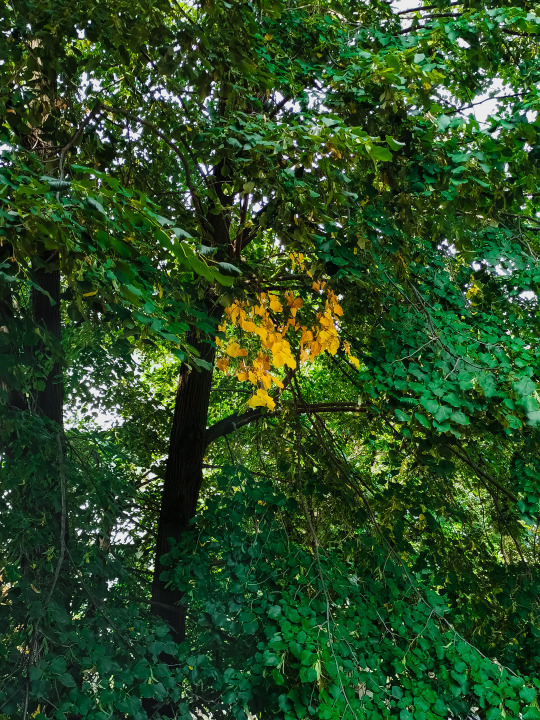
When the school recorded three cases of COVID-19 in high school students (all were infected off-campus, allegedly) we shut down the Secondary and went online. (A few days later, all schools in Romania were closed again, through the winter holidays, due to exponential growth in case numbers.) I have to say: I was relieved to go back to distance learning, if only because I had greater control over the experience, and could even conduct better, more focused 1:1 conferencing with students. The extra time with my family played a role, too, and hanging with Mira for small moments throughout the day was priceless.
***
In early November, we received the news from my mom that the radiologists noticed some interesting spots in her brain scan, conducted after she complained about dizziness during her 3rd round of Doxil, which was halted midway through. Her doctor freaked her out by saying “brain tumors” and “internal bleeding,” even though the findings were inconclusive, and they ordered another MRI for early December, to see if the spots grew in size. Nevertheless, I broke down, a bawling baby myself, sensing the end was near.
it was like hearing the news
about the ovarian tumor
all over again
My mom was experiencing some bizarre neurological symptoms, including dizziness, double vision, and extreme drowsiness, and no matter what the verdict with the brain scans, her health was deteriorating, something bad was going on. She had stopped her treatment, and the doctors were not taking any action other than ordering one more MRI. For a brief moment, I considered flying home for Thanksgiving weekend, but when I called, she talked me out of it. “Don’t come,” she kept saying. “You’ll get the virus.” Promise me, then, I said, that we’ll strive to have more frequent video calls. “I feel real distant from everyone out here in Romania,” I wrote. “I feel distant too,” my mom wrote back.
i was waiting for America
to gets its act together
but viruses and tumors don’t wait
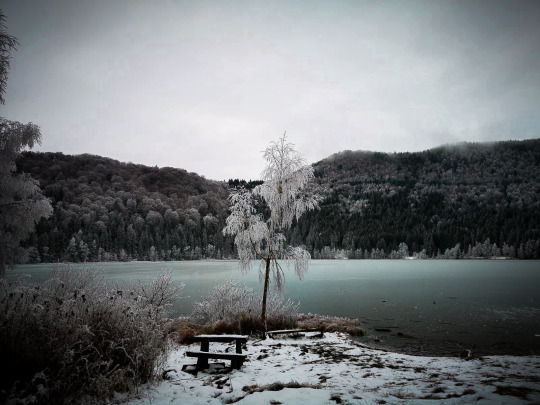
December
My brother and his family visited my mom for Thanksgiving. Yes, it was risky, even with all the precautions and medical-grade masks and eye protection they wore on the airplane. And yes, I stayed home, and called them on Zoom. Caught them just after they had finished Thanksgiving desserts. I had Mira on my lap, and sure enough she looked up at the faces on the screen for at least 45 minutes before getting tired of it. She probably won’t remember seeing all these faces, including her grandma and grandpa, saying silly things at her. But I recorded the whole thing, and I’ll show her the video when she’s older.
My brother reported that our mom was still a bit wobbly, still a little dizzy, had trouble seeing, had to close one eye, but that surprisingly she was pretty much “all there” mentally and verbally. He said he could have a “normal” conversation with her. This was all to say, to us, the other brothers and our niece, to get out there to see mom while we could. While she’s still coherent.
Just a little over one week later and my mom developed more symptoms, such as headaches and vomiting, and worsening symptoms overall. The second MRI revealed that she did not have brain tumors, at least not the growing kind they were expecting. So then, what were all these symptoms telling us? OHSU was not really taking any action on the case, and my mom is not someone who presses for information, preferring avoidance than a sad conversation. But my brothers and I wanted the doctors to know our concerns. So we logged in to her online chart, and sent direct messages to OHSU explaining her progressing symptoms, and the negligent fact that no treatment has been offered to their patient since mid-October, when they abruptly stopped the Doxil after my mom complained of dizziness.
a global pandemic
could no longer stand
between a son and his mother
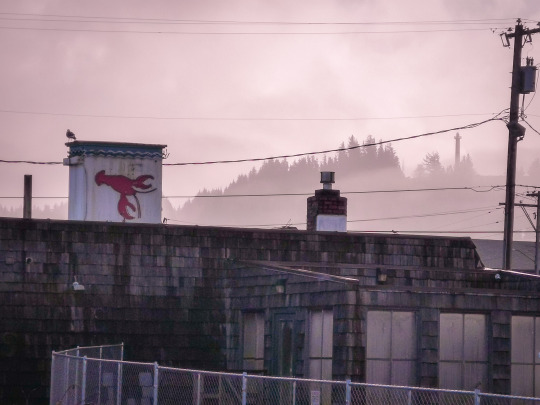
I made a Zoom call to my dad on a Saturday. I told him I was planning on flying out. My mom must have overheard us talking, because she was adamant: “Tell him not to come!” I could hear her in the background. “Don’t come!” But she was in too much pain and discomfort to talk to me directly on Zoom. I slept on it. The next day I activated my open ticket with Turkish Airlines (the one I still had, unused, from the past summer) and rebooked for December 13th through the 22nd. I did not tell my mom until later that week. All she said was, “No way. How are you getting from airport?”
I was able to travel so early in December because I used my final week of paternity leave, moved to blend in with our winter break. While my colleagues and my students wrapped up that final week of school for 2020, I was in for one of the most harrowing journeys of my life, second only to the previous December’s flight to Chicago for my sister’s funeral.
On the flights to the U.S., contrary to what I had envisioned, nearly all of the seats were full. I wore a series of three KN95 masks with a plastic face visor for nearly the entire 26-hour trip from Bucharest to Istanbul to San Francisco to Portland. I waited for nearly everyone around me to finish eating their meal, put their masks back on, before I dug into mine. I only used the bathroom once on the 13-hour flight from Istanbul to San Francisco. All in all, I did what I could. Still, I was kicking myself, telling myself I was so very foolish to think this was a good idea.
once i saw my mom
and the condition she was in
it was the best idea i had
I could write a whole book about the nine days I spent in the U.S., but I’ll spare some of the details for now, though this will still run long.

All I’ll say is that I did not step into a single grocery store in the U.S. The only places I went inside were my parent’s house, Marsh’s Free Museum (a novelty store), the Inn at Northrup Station (hotel in Portland), and OHSU hospital. That’s it. The majority of my time was spent at OHSU’s Adult Oncology floor, sitting in my mom’s in-patient room, tending to her, caring for her, advocating for her, and relaying information out to family and friends. Her COVID test came back negative, so I breathed some relief that I had not unknowingly passed it to her, at least in those first few days.
The trip to Marsh’s Free Museum was my mom’s idea. I arrived late on a Sunday night, and she would be admitted to the hospital on Tuesday afternoon. In the meantime, on Monday, even though she was weak and spent most of the time with her eyes closed, laying down, or reclining in a chair, she wanted to do some Christmas shopping up in Long Beach, a 40-minute drive on the Washington coast. So we all piled into my rental car: my mom, dad, and brother, Ethan. At Marsh’s I held my mom by the arm to keep her balanced, and she used her other hand to steady herself against the shelves. This is a disaster, I thought. She should be in the hospital tonight! Still, she selected some fine colored starfish skeletons for her grand-daughter, Mari, and a ship in a bottle for her grand-son, Mateo.
but lo, who knew this would be
mom’s last ride to the beach, to see Jake
the alligator man, to eat a maple bar,
and watch her husband and sons
walk to the ocean and back
across the wet sand
The morning of the day she was admitted to the hospital, I was sitting down to a cup of coffee and a bowl of granola, when my mom was walking back from the bathroom. She had one hand on the walls, as per usual, but this time she stopped and then slumped against the wall. I jumped up and grabbed her by the arm, to assist her to her day-bed in the living room, thinking she was just dizzy. But by the time we got to the bed, she could not use any of her strength to get up onto it. She slumped down, legs giving out under her, and I called out to my dad for help. Both of us wrangled her into the recliner, and she recovered quickly. (Later we would identify these as seizures.) “This is why I need you to come with me to the hospital today,” I told my dad. “What if this happens on the side of the road?” It was a two hour drive to OHSU, and surely there would be a need for a smoke break or bathroom stop. In the end, since only one of us could accompany her into the hospital, my dad drove his van behind us all the way to Portland. Once we got settled in her room, he drove the two hours home, to wait for my news.
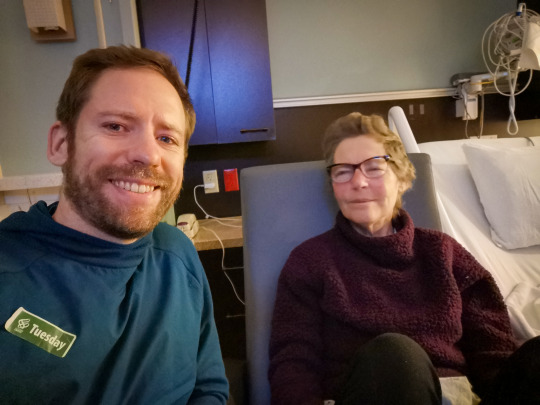
The only way I can make this scenario less tragic is to say, at least my mom did not succumb to COVID-19, isolated from everyone, a phone held up to her face, while she sat mute, breathing with a ventilator. Instead, she was well cared for at OHSU, and while visitors had to adhere to special rules, she would not face her final weeks alone. I could stay by her side through her first five days there, when we were still hopeful that the experts could clear up her symptoms, and then get her back to the status quo on her ovarian cancer. At one point, that first night in the hospital, on the way to a CT Scan, my mom asked, out of the blue, “Will I ever see you again once you go back to Romania, Charlie?”
i stuttered out a yes,
bit down on my tongue
uttered: just make it to summer
I won’t go into too many details here, the twists and turns of diagnoses and prognosis. Except to say that at one point the doctors had to do a lumbar puncture (aka spinal tap) to test the cerebral-spinal-fluid (CSF) and its pressure, as well as to extract extra fluid. And they did the procedure right there in her room, as she sat on the edge of her bed, hunched over a tray table. I held her hands, squeezing them as she ooh’d and ahh’d at the scratch and pokes of that terribly unnerving procedure. But then, afterwards, my mom slept a most peaceful sleep for two hours. No pain, just slumber. Then she woke up and was hungry, wide awake, and wanted a shower. Four hours later the fluid had refilled, and she was back in pain, muted, and sleeping.
By day four the nurses were telling me that I should take more breaks. Hinting that maybe I should sleep in the Family Room for overnight visitors. Get well rested, they said, so you can be 100 percent during the day, when you are needed. But I also knew, in the back of my mind, that mom was right; I would not be returning from Romania anytime soon, and she was not likely leaving this hospital anytime soon, either. She seemed to get ever so slightly, progressively worse with each passing day. It’s difficult to say whether she got weak because of an extended hospital stay or it was the multiple cancers taking over her body. Probably both.
A close friend of mine, speaking from experience watching his own parents pass away slowly in a hospital room, gave me some sage advice: “Now, being in the room with her is the greatest gift you can give her. Your presence will give her strength. Though it may differ from one person to another, I never felt the need to have, for lack of a better phrase, ‘cinematic conversations’. Just sitting there, being there, being an advocate when necessary, that was it. And, it was enough.” And it was, truly, enough. Even so...
My brother flew out from Colorado for the weekend, taking over for me as mom’s advocate, though he did not catch her at a good time, and did not have any “normal” conversations with her. (Later he was able to call her on the phone and have that much-needed conversation.) When my brother had to fly home, my dad took over for us, as I drove back to Astoria to collect my suitcases. I also got to meet my niece’s infant son for the first time, as she and her husband had driven up from California, part of a temporary move to be closer to her grandma, for caretaking purposes. My niece had lost her mother, my sister, the previous December, and now she was losing her grandma.
we were in a cruel cycle of life
and death, trying desperately
to shift into something new

When I returned to Portland the next day, the night before my flight back to Romania, I stopped in for one last visit. My mom was doing much better, now that they prescribed her steroids to fight the inflammation in her head. She was talking on the phone. She opened up my family’s Christmas gifts to her. She was asking for a shower. The nurses equivocated about the shower (as it would require three nurses, likely) but helped set her up for a good tooth brushing and mouthwash rinse, while I held her spit bowl for her.
pay attention to the ritual
of brushing her teeth—
five solid minutes of cleansing
When the nurse asked her where she was, she said, “Loyola? Maywood?” This hospital and this place she spoke of are both in the Greater Chicago metropolitan area. They are likely where mom’s mother, my grandmother, was taken to treat her bout of cancer, and where she passed away in 2005. Mom was adrift in time and space. She only knew it was December, and that her son, Charlie, was also in the room, who would do anything for her that she asked.
She then asked me to rub Salonpas lidocaine on her legs, as her legs were painful—had been painful for several months—and I did so. Finally, after she had ordered pureed chicken noodle soup for dinner, there was a lull in the action, and the CNA was busy typing something on the computer in the corner. My mom was looking at her phone. She could only really focus on her phone or the TV screen in those days, and I realized, then, just how much she had been affected by the pandemic social isolation, too.
I kissed her on the forehead and told her I was flying home the next day, that I had to say goodbye, that I would not see her again this trip. She said OK, and I could see her eyes were watering. Not crying, as she could not cry, even though earlier she said she “wished she could.” But deep down inside, I believe, she knew she would never see me again. Then she immediately grabbed my hands, closed her eyes, and launched into a prayer. My mom had not been too verbose the past few days, as the cancer was likely causing aphasia—or the inability to produce verbal language—but the words just flowed out of mom’s soul that evening. She prayed for at least five minutes, as if she were speaking directly with God, or as if God was speaking directly through her.
she used to want me to pray with her
when i was young, though time
and space had torn this tradition in two
time had collapsed
& mom was with grandma
& i was eternally present with my mom
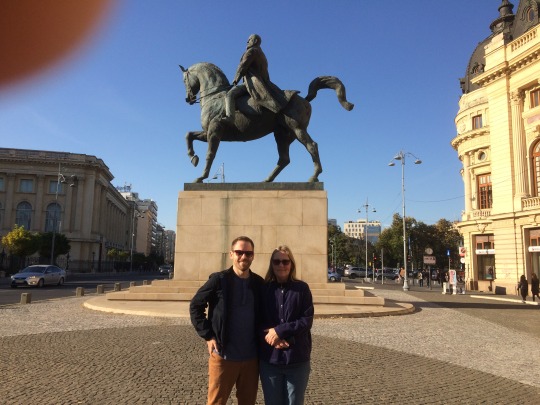
What do we need to feel closure? What secret code words need to be said in order to find peace? Back in college, in the early 2000s, I wrote a short story entitled, “Proper Partings,” and the main character, a father in his early 50s, is struggling to mourn over his wife, who has just passed away to ovarian cancer. He is on a short vacation in Venice, as per a recommendation by his son, and is seeing his wife appear as an apparition amongst the crowds. The main theme of the story comes across towards the end, with the line: “There is no such thing as a proper parting.” I still hold that to be true, as it cuts us all some slack. We don’t know, with 100 percent certainty, that it is truly a final farewell. Indeed, over the course of a few days, I had several false goodbyes. No goodbye is perfect. However, my mom saying a prayer with me, a prayer for peace and hope, comes close.
now that i know what cancer truly looks like
i must go back and rewrite
my entire story

I am now back in Bucharest. It is a few days after the New Year. I made it back all safe and sound, spent my Christmas and New Year’s Eve with my wife and daughter in quarantine, and my recent COVID test came back negative. I have been staying in touch with my dad, my brothers, and my niece, as they stay by my mom’s side, knowing each day may be her last. She is still on the same floor at OHSU, in the same room I left her, in the same bed, and now the goal is pain relief and comfort for her end-of-life care. Doctors drain some fluid from her brain every other day and she perks up a bit, eats a few bites of cheesecake or yogurt, takes a few sips of Gatorade, and makes subtle facial and hand gestures to show that she’s still in there, somewhere deep inside, but just can’t form the words. She can’t type on her phone anymore, either. The last few messages she sends to our family chat are GIFs and emojis.
poetry was a special language
between mom and i
blue heart emoji
As I left my mom’s room that night, a few days before Christmas, she said, “Love you, Charlie.” I love you, too, I said. “Merry Christmas,” she said. Merry Christmas, I said, walking out the door. As I drove to my hotel that night, the following mantra played on a loop in my head, getting louder and louder, until I believed it wholeheartedly, with all my soul:
No fear.
Mom is God.
God is Love.
Mom is Love.
No fear.
Mom is God.
God is Love.
Mom is Love.
No fear.
Mom is God.
God is Love.
Mom is Love.
1 note
·
View note
Text
The Enduring Value & Critique of Kindergarten Cop (1990)
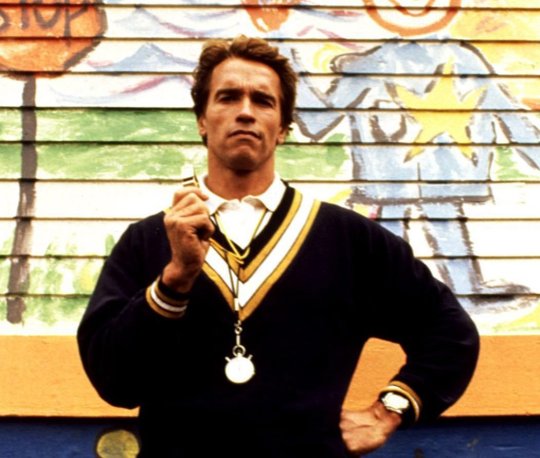
After 30 years, why are people still drawn to a comedy-thriller about a police detective forced to perform the “duties” of a kindergarten teacher? Maybe it was because of the new type of male masculinity that actor Arnold Schwarzenegger presented in Detective John Kimble, as Tatiana Prorokova points out, in the journal Masculinities and Social Change? I mean, the comedy of the film is purely of the late ‘80s and early ‘90s social era: a self-described tough guy who takes on a predominantly female profession and is humiliated to the point of exhaustion and fear by precocious young children. We all can nervously laugh when the fumbling Detective Kimble attempts to help a young girl unbuckle her overalls so she can go to the bathroom, and has to ask a female teacher for assistance. Sure, he can pull out his shotgun and intimidate an eyewitness into testifying against his archnemesis, Cullen Crisp (Richard Tyson), but he can’t even go 10 minutes in a classroom of youngsters before they ruffle his feathers, forcing him to scream, “Shut up!” at the top of his lungs, and then retrieving his pet ferret to calm down the emotional trauma he just inflicted. These early scenes in the film are fascinating to watch because they force the tough guy archetype to become vulnerable, to tap into the feminine forces of his nature, for once, and respond to people as if their emotional needs are a priority. This is a long cry, let’s just say, from Rambo and Commando. This trend predated the rise of the stay-at-home dad, and the ever-changing redefinition of what it means to be male and female, father and mother, teacher and cop.
Even the main villain of the film, the drug-dealing murderer Crisp, is a mama’s-boy who just wants to be reunited with his son, so he can raise him alongside the boy’s cruel and hell-bent grandmother. The true villain of the film, in the embodiment of the grandmother, Eleanor (Carroll Baker, in full domination mode), who claims she just wants to be a “family” again, sends nervous tingles up and down my legs every time I consider it. Was this commentary on the totalitarianism of a grandparents’ sense of ownership over their grandchildren? Was it commentary on the collapse of the normative nuclear family? On how both heroes and villains inherit their worst traits from their parents and grandparents? Trying to answer some of these questions is why I keep returning to this film, keep rewatching it every few years, and keep trying to understand its subliminal messages. I suppose this is one reason others find the film fascinating for the past 30 years.

And now for another, more personal reason I still watch this film: Kindergarten Cop was filmed in my hometown of Astoria, Oregon, and I spent three days of my summer vacation standing around as a hired “extra” on a bluff overlooking the Pacific Ocean, getting sunburned and eating as many doughnuts at the catering table as I could stuff in my mouth, only occasionally doing something of value for the movie producers. I was, myself, kindergarten age at the time, and I distinctly remember being told by my family that I would be an “actor” in this film. The title, in my adolescent mind, evoked a film about a bunch of kindergartners running around dressed as police officers, saving the world, or something. I mean, that would be cute, in a way, but not exactly a healthy message about the state of the world. I mean, what kind of society would allow tiny children to carry guns? To arrest and/or shoot criminals? To enforce the law? (Oh, yeah, point taken.)
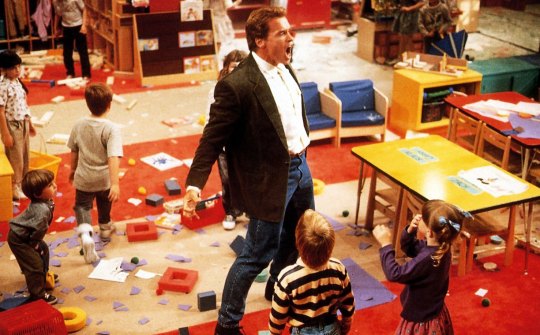
It turns out I was kind of spot-on in my adolescent prediction. Halfway through the film, Detective Kimble recognizes that what his classroom needs is some serious law and order. He calls the children “soft,” claims they “lack discipline,” and immediately institutes a police academy within the classroom, calling his students his “deputies.” In Kimble’s eyes, he is the benevolent dictator, and his students are his foot-soldiers, following orders because, suddenly, he inspires them. The school principal even states that she does not agree with his “methods,” but yet he is a “good teacher.” In my view, this is where the film loses its moral grounding. Instead of Kimble tapping deeper into his newly awakened social and emotional side, tapping deeper into the worldview of a wide-eyed kindergarten-aged human, he instead institutes a kiddie-version of the police state within his own classroom. Disobedience is not tolerated. Respect for authority figures as the ultimate salvation from negative consequences. And if you get out of line, the teacher-dictator will scold you, and your feelings will get hurt, because you look up to this adult for guidance. In other words, classroom management, as it was taught in the early 20th century, and is still taught in many parts of the world today. Let’s just say it’s a very far cry from the progressive Reggio Emilia method, which centers on relationship-driven environments.

And yet, who can fault an Austrian-American cop for falling back on methods that seemed to work back in his own family’s past, under fascist rule, for getting folks to like you, follow you, and carry out orders, without question or conscience? Kimble’s entire family were cops, he explains to his partner, Phoebe (Pamela Reed), as a way of explaining it as the only way of life he knows. Back in the 1990s, the masculine archetype of the tough-on-crime cop was rightfully being called into question. As but one example, O.J. Simpson was allowed to walk free from murder partly because a Neo-Nazi police detective, Mark Fuhrman, happened to be the prime investigator at the crime scene. There was a sense, at the time, that a greater evil than a double case of murder was, by and large, this endemic disease of racist cops, a pandemic that continues to the present day, all efforts at politically correct Band-Aids be damned.
In my fantasy world, I wish director Ivan Reitman—or perhaps his son, the more-nuanced director Jason Reitman—could go back and release a new cut of Kindergarten Cop. Instead of using police tactics to enforce good behavior amongst his pupils, I would like to see Kimble, instead, grow into his role as an emotional coach. Instead of Kimble’s takeaway being, “Hey, the police academy taught me how to control students in a classroom!” maybe his takeaway could be, “Hey, maybe I can take some of this ‘emotional work’ that everyday teachers powerfully employ every day and apply it to my job as a community law enforcement agent, entrusted to ‘protect and serve’ the people in my precinct.” That would be the ultimate twist on this tired tough-cop-turned-soft trope: the reformed cop goes back to his unit and teaches them about restorative justice. (It’s telling, too, that the 2016 direct-to-DVD sequel, Kindergarten Cop 2, features the same scenario, pretty much, as the first film, but the macho, old-fashioned cop now must deal with, and overcome, “a liberal, politically correct environment.” Again, the answer seems to be: promote the much-easier politically correct ‘masking’ of toxic masculinity over the introspective, multifaceted, much more difficult growth-based and interdisciplinary work needed to actually implement change.)

Recently the Northwest Film Center, a Portland-based “regional media arts resource and service organization,” has caught online flak for launching its summer drive-in movie series with Kindergarten Cop, as both a nod to its being filmed in Oregon as well as to honor the occasion of its 30th anniversary. I’ll give the NWFC the benefit of the doubt that this programming decision was made pre-George Floyd and the police brutality protests that have ensued across America to this very day, particularly in Portland, and just state that they are correct in withdrawing the film, at this sensitive moment in time, from public exhibition and quasi-celebration. My only hope is that this controversy spurs more people to revisit this film on their own terms, with a critical eye, and catch all that they may have missed on their first dozen screenings. Even Spike Lee intentionally screens Birth of a Nation in his film classes, as one should never look away from controversial art, but instead look closer and deeper.
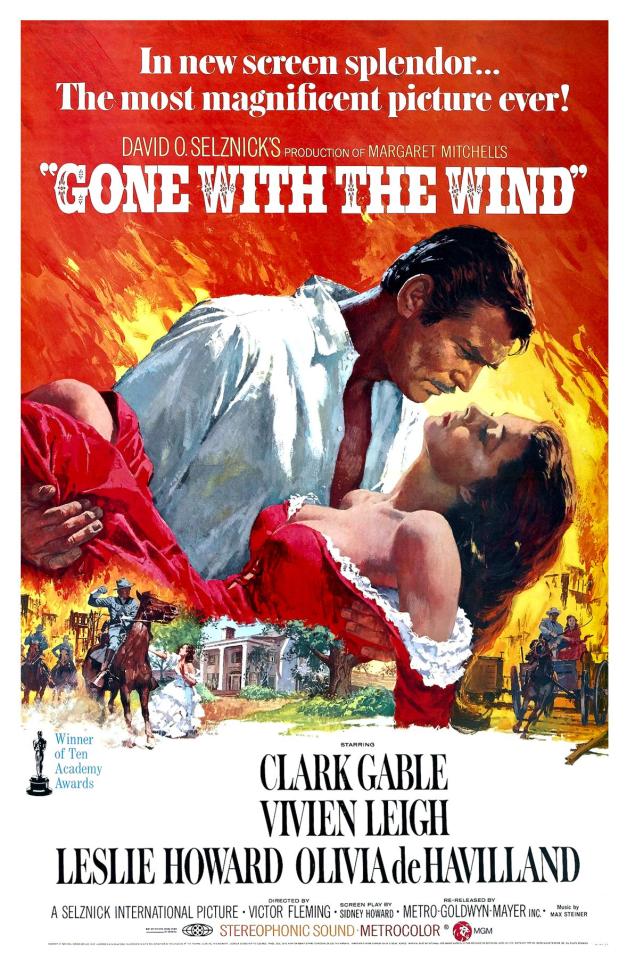
And can we just stop for a moment and marvel at the Fox News headline “'Kindergarten Cop' screening canceled in Oregon, compared to 'Gone with the Wind'”. I never thought, over the course of 30 years, Kindergarten Cop would get its due as a film ripe for critical analysis, in the same pantheon as Gone with the Wind and Birth of a Nation. But apparently its current detractors are making the case for it to be screened in film and media studies courses from now until perpetuity, which, as a fan of the film, despite its shortcomings, I would endorse. Anyone watching this film should begin with the protagonist’s own line of inquiry, upon first entering the classroom: “First, I’m going to ask you a series of questions,” Kimble booms, while he still has a captive-but-tentative audience, “and I want them answered immediately.” Your answers into your own inquiry to this film should, rightfully, reflect how this text reads you, in all of your complex, multifaceted, strange selves and histories.
#Kindergarten Cop#arnold schwarzenegger#criticalthinking#filmcriticism#toxicmasculinity#restorativejustice#kindergartencop#films#Astoria#Oregon
0 notes
Photo
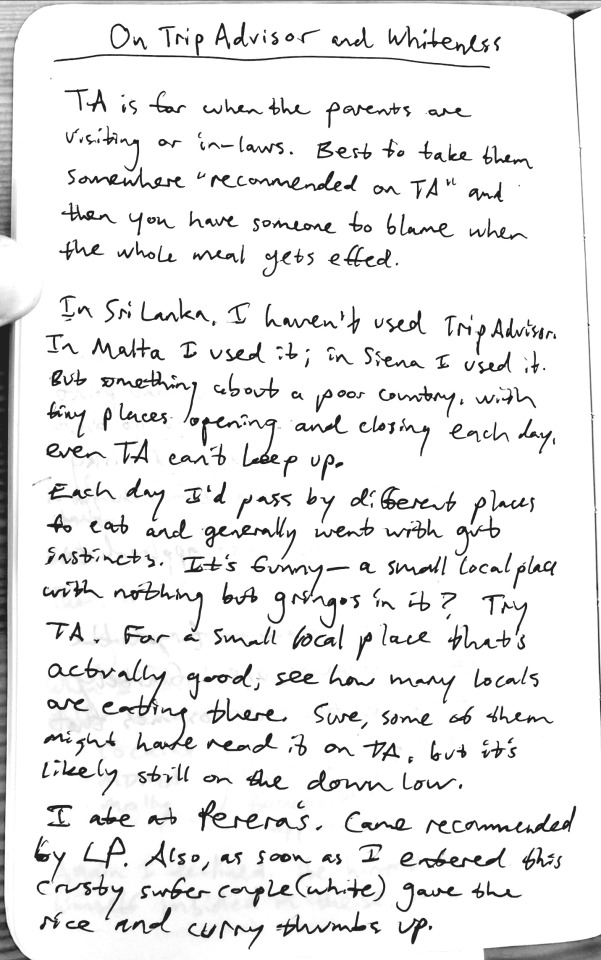
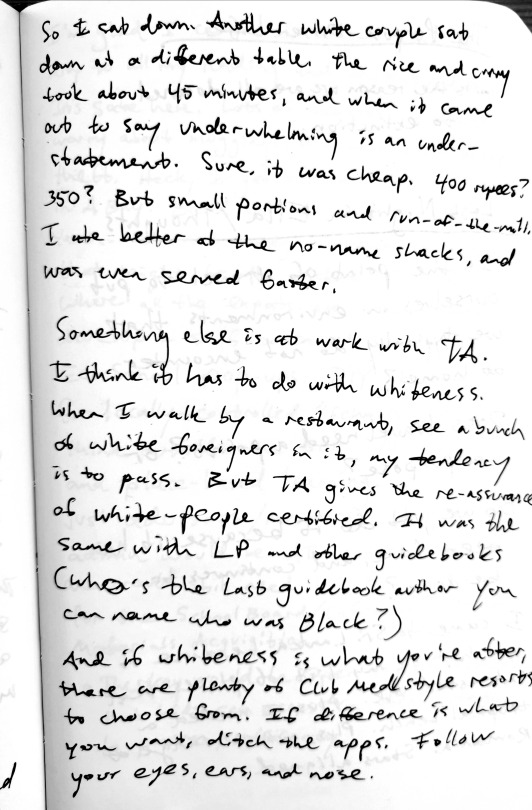
“On TripAdvisor and Whiteness” - micro-essay, 12/29/2018
0 notes
Text
Alternate Universe Wedding

Today, June 24th, 2020, was supposed to be the date of our “family wedding,” held on a bluff overlooking the Atlantic Ocean, near the small surf town of Sagres, Portugal. We would have all congregated at Cabo Sao Vicente, caravaning in rental cars, parking along the road to the scenic lighthouse at the end of the cape. Some Portuguese friends of ours would have scouted the area in advance, keeping onlookers at bay, and arranging some special flowers and driftwood to focus the audience’s attention. Then the families would have arrived next, making the short, two-minute trek to the overlook. Next, I would have arrived and escorted my parents to the spot. Finally, Ani would arrive last, with her parents, and she would promenade to the overlook, in the wedding dress she bought in Russia, where we would all be waiting.
She would have looked spectacular.
The ceremony would have been short and intimate. We would have already been technically married, as we arranged at the Bucharest City Hall, back in January. Thus, the plan was to exchange our vows, kiss, and then pop champagne (and sparkling water) for a toast. This would all be taking place at about 7pm, in the golden hour, and so there would be photos and videos, in many different configurations.
Then, we would have all caravanned back to Sagres town, to Three Little Birds, where we had plans to book the entire restaurant for the evening for a soiree of merriment, great food, irreverent speeches, cake, and all the rest of the hoopla associated with a small gathering of two families from the opposite sides of the planet. As few in Ani’s family speak English, and none of my family speaks Russian or Armenian, there would be some translating, and a whole lot of friendly gesturing. All in all, we would speak the universal language of smiles and laughter.
The next day, a BBQ was planned for the apartment complex we had rented out, mixing American, Portuguese, and Armenian BBQ traditions. It would be a day for relaxing, and maybe some surfing, too. The main goal of our “family wedding” was to allow our international families to meet, for perhaps the first and last time. After this BBQ, our goal would have been accomplished.
This was the plan, anyway, up until late January and early February, when we were struck by two blows. The first was the diagnosis of my mom’s stage 3 ovarian cancer. As soon as it was clear that there would be no chance she could attend, Ani and I made the executive decision to cancel the whole shebang, and allow my family to refocus our efforts on my mom’s health. One of my brothers, the only one who had already made bookings, tried to dissuade us initially, but we stuck with our decision. In any case, shortly after this, we got hit with the second blow: a pandemic. By early March, it was quite clear nobody would be headed to Portugal in June. Even Ani and I held on, thinking we could still go to Portugal for some summer vacation relaxing, but our flight was soon canceled, too.
I would be remiss to not mention the collective sigh of relief Ani and I exhaled once we had made our decision to cancel the family wedding. From the start, we had wanted to keep it low-key and stress-free; somehow those descriptors are only rarely, if ever, paired with such a thing as a “wedding ceremony,” it seems. The entire operation had taken on a life of its own, and we could feel the stress levels rising, particularly when late January hit and nobody from either of our families (aside from that brother) had made any bookings.
The good news, out of all of this—aside from the stress-relief—is that Ani and I were already married by the time all of this went down. We already knew that we had to make it official in Romania prior to June 24, and we could have arranged it all for May, for example; instead we got hitched on January 17, 2020, in a small ceremony at the Bucharest City Hall. My friend and colleague Rita was my witness, and Ani’s friend Dasha was her witness. We gathered that Friday afternoon with our hired translator, and waited for our turn. Ahead of us, a couple had invited 30 or so guests, and everyone was so well dressed I had literally believed that we were among many couples waiting to get married that day. When it was that couple's turn, all 30 guests crammed into the tiny room with the officials for the 5-minute ceremony.
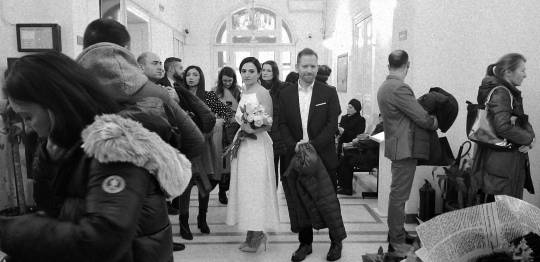
The surprise of the day came with just 15 minutes to spare, when Ani’s brother and sister-in-law showed up, having just flown in from Russia (talk about Pre-Coronavirus Miracles!). Ani was so surprised to see them, as was I. We both had dressed up, but not in what we thought would be our “official” wedding attire. In retrospect, that cold and gray day in January was, and will be, our official wedding.

After our 5-minute ceremony, in which I barely could focus on the words the translator was speaking into our ears, we were whisked across the hall for our 10-minute slot of time to pop champagne and toast. We just had enough time to take one or two sips, and then we were shooed out of the building, where we took more photos, and just tried to soak up the moment as best as we could.

Later that evening, Ani and I gathered at the Mikeller Pub, along with our Bucharest friends, to toast the day. It pretty much encapsulated our style: low-key and informal.
And so, today, we will raise another toast, to an alternate universe that is no longer ours, or anybody’s, reality.
The world has changed.
We have changed.
The two of us
become one.
0 notes
Text
The Yellow-Brick Road
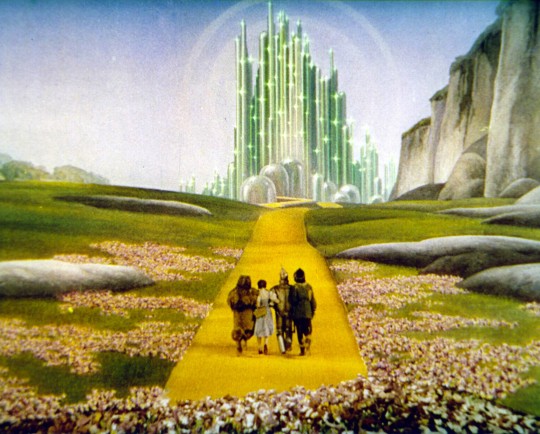
Screens. Endless screens.
Operated by wizards, innumerable and unmuffle-able wizards.
Previously, before the pandemic, pundits and academics alike claimed we inhabited a world mediated exclusively by the filtered and algorithmic echo chambers of the Internet. An Internet, of course, conveniently set up with our own preferences and predilections in mind. In short, a hyperreality. I tended to believe this line of thought, but then I would go outside, meet people on the street, travel about the world, see for myself, and realize: the world is infinitely more complex than my Google News feed indicates. And so my mind evolved: I soon believed we were living in a virtual world mediated, or kept in check, by frequent collisions with the real, objective, empirical world.
No more.
(At least, I hope, temporarily “no more”.)
Now, after the pandemic, sheltering at home for the past six weeks, my sole access to “reality” is through the screens. Endless screens. Sure, there is a “window” in my apartment that tells me that, yes, the sun came up, yes, the spring blooms are still blooming, and yes, masked people are indeed still shopping for groceries and avoiding each other on the street. As I gaze out my window, at the lulling quiet of my neighborhood, birds chirping ever so loudly, rudely, I am led to believe that all is well. But then I realize that the window must be lying, because the screens are all screaming at me that nothing is A-OK with the world: Outrage this! Outrage that! Cases spiking! The insanity of reopening! The insanity of staying locked down! Numbers number numbness! He is to blame! She is to blame! They are to blame! We are to blame! BLAME!
The screens tell me that I must stay inside, stay safe. They tell me that cases are rising, deaths are rising, and there is no verification that what they are telling me is a truth or a lie, at least objectively. And I’m not being facetious about this: It’s not like a public safety officer came knocking at my door to calmly urge me to take the necessary precautions to “flatten the curve.” It’s not like I can go run up to that ambulance screaming by outside and ask to see, for myself, that someone is, indeed, gasping for air in there.
No.
Here in Romania, we have to carry a self-written note, translated in Romanian, in our pockets whenever we leave the house to go to the store, the pharmacy, or a walk around the block (exercise, I’ll call it). We are to hand over this scrawled note to any police or military officer who demands it. Though nobody has ever asked me to provide this proof, I comply because the screen has told me that I must comply. Yes, I have seen police officers stationed at intersections, and it seems they randomly pull over people to check their papers. This logically leads me to conclude that what the screen told me I now had to do is, indeed, necessary to do. (The threat of a $2,000 fine is also a strong case for compliance.) Though I can see how people can, and will, grow frustrated with people talking about something, in an abstract way, without ever laying eyes on it, without tasting it, without smelling it, without crumpling into a ball of tears over the realization that they, too, have caught it. (In a way, I think the anti-lockdown protestors secretly just wish, through their public commingling, to catch COVID-19 once and for all, verify its veracity, and be done with it. In that regard, I think they’re on to something.)
But when I do walk the streets, to buy groceries, or to go for an evening stroll, all seems so very calm and peaceful. Empirical reality is not matching the messages spat out by the screens. The same screens that tell me what the scientists have concluded and what the epidemiologists have predicted also tell me that everything that I am reading and seeing on the screens is all wrong, or biased, or propaganda. And there is no way to verify the truth, empirically.
It seems, from my looking at all these screens, is that they are not showing me what is really going on. I wish, for example, I could have access to a website where every single COVID-19 patient in the world was live-streaming their battle against this disease. Yes, despite such a huge invasion of privacy, I would be OK with watching a cacophony of pneumatic coughing and beads of sweat pooling on the brows of feverish patients, sequestered in their beds, in home; or in a tent, in the homeless camp; or on a cot, in a prison cell; or in the ICU, hooked up to a ventilator, an iPhone shoved in their face so their loved ones can say their last goodbyes. Acknowledging the fact that such a website would be labeled a “hoax” by coronavirus-deniers, with claims that all 2.5 million of the people displayed on the webcams were just paid actors, it seems, nevertheless, like this collective portrait of what is going on is what has eluded the screens: mass confirmation that we are in this thing, together, whatever it is, for the right reasons. For the moral and just reasons. And, since this “reality” does not quite exist, on my screen, at the moment, my primary portal to the outside world, it simply must not be real.
***
OK, now I should admit that I do believe this COVID-19 reality. I do believe that this is a serious public health threat. I do believe this, because my personal daily intake of screens comes with a main course of trusted, reliable, non-profit news sources—many of whom tell these kinds of stories, if from a moderately left-of-center perspective—and also a healthy side dish of skepticism.
A skepticism that pleads, “Where is your empirical evidence to support your claims?”
A skepticism that asks, “What are your credentials? (And ‘I’m a doctor’ or ‘I’m the president’ or ‘I’m infected’ does not cut it, does not make you an automatic expert, sorry.)”
A skepticism that wonders if, truly, we can expect democracy to survive if everything the public reads and sees through a screen becomes their only access to reality.
This would be a nightmare scenario.
Unfortunately it is the nightmare scenario standing right in front of us, but we can’t see it. Reality, as Jean Baudrillard warned, has been air-brushed out of existence. We witness only the simulation of real life, projected and mapped out by our brains piecing together a million different inputs from the screens, controlled by wizards.
Until reality, of course, catches up with us.
Cue the coronavirus, that insidious agent-provocateur...
...unmasking the clear and present danger of a mentally-unhinged president,
...disrupting the best-laid plans of wannabe dictators,
...tanking the junk economies that favored the wealthy,
…turning a barrel of crude oil into something so worthless oil corporations will pay you to take it off their hands,
...disproportionately killing those most impacted by the environmental racism and injustice of government policies and lax regulations,
...sending world leaders to the ICU, to the bunkers, or disappearing altogether,
...and, of course, forcing millions of infected people worldwide to that horrific of existential questions: Will I be one of the few who succumb to this, or one of the lucky ones who survive to see that light at the end of the tunnel?
COVID-19, at least the viral agent that exists in a biological sense of the word, may be perhaps the one thing that can crumble our screen-mediated world, bringing reality back into sharp focus. Our bodies, and the bodies of others, will become real again. But, it will take time, and it is a long, long road.
Currently, by the latest official tally, on April 20, only 0.03% of the global population has experienced this reality empirically. It is the collective voices of this tiny minority that must shake us awake to what is really going on, but unfortunately we are at the mercy of Internet wizards. The Wizard of Oz, like these wiz’s of today, was great at persuading and convincing a terrified population of rural Kansans, but hid behind a thin curtain, easily revealed by a dog with a keen sense of smell. There are many wizards out there, too many to name here, and we face an uphill battle in telling the good wizards from the bad wizards.
It may be a long, yellow-brick road indeed.
#COVID-19#coronavirus#screens#hyperreality#Wizard of Oz#simulacra#Baudrillard#simulation#mediated-by-images#unreality#reality
0 notes
Quote
Aristotle distinguished between relaxation (anapausis), which is when we take a rest from activity with a view to resuming that activity, and true leisure (scholē), which is inaction meant for a higher purpose—theoria, or contemplation. The academy exists for the sake of contemplation. (Indeed, the English word ���school” comes from scholē.) Contemplation is not readily classified as a belief that one fights for, and attempts to squeeze its value into the language of justice or dignity or basic human rights will fall flat. It is better characterized as an object of love and reverence, and a source of fulfillment. For humanists, contemplation is not a cause. It is a calling.
What Do the Humanities Do in a Crisis? (The New Yorker)
0 notes
Text
Desiderata for the 21st Century (2006)

Don’t go placidly amid the noise and haste.
Forget what peace there may be in silence.
Don’t be on good terms with all persons.
Don’t speak your truth quietly and clearly.
Don’t listen to others.
Don’t avoid loud and aggressive persons.
Don’t stay interested in your career.
Don’t exercise caution in your business affairs.
Don’t be yourself.
Be cynical about love.
Always feign affection.
Don’t take kindly the counsel of the years.
Don’t gracefully surrender the things of youth.
Don’t be at peace with God,
whatever you conceive Her to be.
Do not keep peace with your soul.
With all its sham, drudgery, and broken dreams,
it is not a perfect world.
Don’t be cheerful.
Strive to be mad.
0 notes
Text
Everything You Know Today Will Be Wrong Tomorrow

It has been three weeks since my wife and I have entered a semi-quarantine in our apartment in Bucharest, on Friday the 13th. She had just arrived back from a relative’s wedding in Russia, and things were moving so swiftly in that week, between March 9-13, that I was growing concerned she might get trapped in her country of citizenship.
In the previous few months at my school, as we quickly learned about the novel coronavirus because of our large population of Chinese students, we had been swiftly moving through various stages. Initially, we had Chinese students confusingly show up to school wearing face masks, as if they feared catching this virus from their classmates and teachers, or that they were coming to school sick. (That, it turned out, was just our own cultural biases playing out, as the Chinese—and Asians in general—have been putting on face masks for a variety of reasons in the past few decades, including high pollution levels.) I remember reassuring my 6th grade homeroom students that, according to the trusted news sites I was reading at the time, the coronavirus was hardly more virulent or dangerous as the common flu. I didn't quite understand, at the time, that when I was quoting a 1% to 3% fatality rate, that these “low percentages” were exponentially more deadly than the common flu. A month later, I shake my head at what I told my students, who look to me as a beacon of trust. I have since come to understand only this new reality: Everything I Know Today Will Be Wrong Tomorrow.

As it seemed that China’s draconian measures were leading to containment, my students and I relaxed our guards. My Chinese students stopped wearing face masks. And yet, even still, I had my upcoming trip to Ethiopia to consider. The foreign relations between China and Ethiopia have been growing ever more closely tied in the past decade. Even when I spent the year 2011-2013 in Ethiopia, this relationship was visible everywhere throughout the country. Huge numbers of Chinese were living in Ethiopia, employed in various infrastructure projects throughout the country. The Chinese had recently completed the new African Union headquarters in Addis Ababa, along with, in 2018, a light-rail system in the capital. A week prior to departing for Ethiopia, on February 14, angry editorials in Ethiopian newspapers criticized Ethiopian Airlines’ continued direct flights to large Chinese cities. The global fear was settling in.
Upon arrival at the Bole International Airport, in Addis Ababa, one could not ignore the sea of face masks on the passengers arriving from around the globe. At one point, we had to board a transfer bus that would take us to the domestic terminal, and we watched as the bus emptied its passengers from a recently-arrived flight: Every single passenger had a face mask on, irregardless of their nationality (and about half looked Asian). There was no doubt this flight just arrived from China. I stepped onto the bus and tried not to breathe too much, nor touch too many surfaces, in the 4 minute ride.
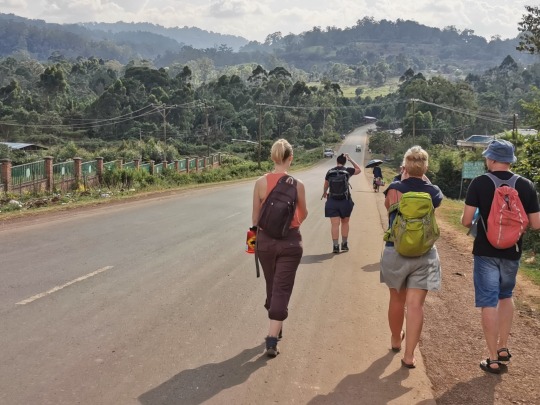
Deep in Ethiopia, there was no trace of the coronavirus, nor awareness of its possible presence. The Ethiopian authorities were more concerned with stop-and-frisk policies in and around the regional capital of Jimma, where pockets of Oromia were still occasionally rising up in violent protest. A bit foolhardy, I remember suggesting to my colleagues that we walk the 45 minutes through Jimma, with our luggage, to our hotel. We were in desperate need to stretch our legs, and all agreed. However, in the seven years since I had spent significant time there, Jimma had turned into an even more populated, exuberant, and stressed place. Our walk went fine, though I’m pretty sure we inhaled a critically unhealthy supply of auto exhaust en route.
This followed a similar pattern throughout our time in Ethiopia: we forgot about any viral threat, and worried more about the viral threat of a mob growing mad at our unwelcome presence in their tiny village at 8:00pm at night (that’s a story for another blog, on another day...). I did bring a face mask with me on the trip, but I only seriously used it on the minibus ride from Bonga to Jimma, where I was more concerned about exposure to tuberculosis. Yes, there are some epidemics out there that are more scary than COVID-19, and a huge proportion of the developing world lives with these scary pathogens on the daily.
The coronavirus did not properly slap us in the faces again until we arrived back in Rome, waiting to transfer to our flight to Bucharest. I noticed that nearly half of the passengers were wearing a face mask. Still, what I had read online was that the airplane cabins have some of the cleanest air you can find, since it is constantly being filtered. I did not fear.
When I arrived back in Bucharest on February 23rd, I read about the outbreak in the northern regions of Italy. The next day the Romanian authorities said that all people who had transited through the regions of Veneto, Lombardy, and Emilia-Romagna were ordered to go into self-quarantine for a 14-day period. After some initial confusion, with students who thought they were in the clear because they had just changed planes in Milan, a significant proportion of our students had to stay home. Many had recently returned from ski trips to the Italian Alps, or from shopping trips to Milan, and were now faced with quarantine. Other students’ families kept their children at home out of an abundance of caution.
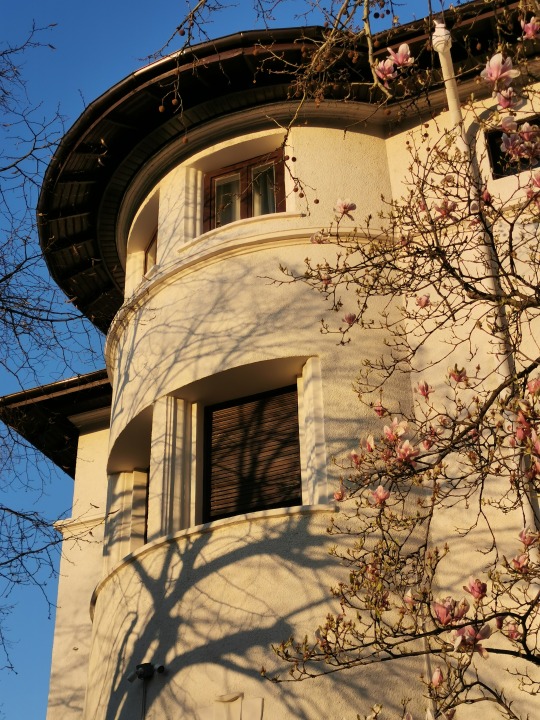
And so the weeks grew stranger. Within a few days, it was announced that all CEESA events were canceled through May 1. CEESA is a consortium of international schools that co-host sports and activities amongst member schools, as well as an annual conference in April. I was faced with breaking the news to my Model United Nations members, who were a dwindling lot in any case, due to quarantine measures, that we would not be traveling to Kyiv, Ukraine, in early April. Our reason to be quickly grew thin. We made plans to focus on an on-campus MUN conference scheduled for the end of March. Still, morale plummeted.
I continued to teach classes, communicating with students who were doing distance learning in quarantine. These students were due to return to school on Monday, March 9, and I remember a few had to be sent home because they did not have a doctor’s note. Nevermind that COVID-19 testing was only available to those who showed symptoms and had traveled to high-risk areas. Basically, if the students were asymptomatic, they were allowed to return to school, having cleared the 14-day quarantine. We now know that some asymptomatic patients may be able to transmit the virus up to 40 days after testing negative. Too many unknowns, and constant revisions to the best practices in daily life, are starting to shake people’s trust in even the most trustworthy sources.

Now that school has closed, I am continuing to work from home, delivering digital lessons in a variety of synchronous (live class session) and asynchronous (work at your own pace) methods. It has been draining, to be honest, as nearly everything requires intricate digital manipulation and advanced preparation. The load of online documents that require feedback has swamped me. That being said, there are some practices I am honing now that I hope to continue back when we return to a classroom setting, such as the use of interactive Pear Deck slideshow presentations. I also miss seeing my students in person. While I have had some pretty interesting and deep interactions with students using Zoom teleconferencing, free of the distractions of That Disruptive Student Constantly In My Peripheral Vision, everything pales next to real human interaction.
I am now trying to embrace the unknown. I try to be as kind as possible with those who tell me, “Face masks are a must!” I navigated a heated debate amongst my 6th graders about the use of these face masks, and I think I was able to show the pros to both wearing them and not wearing them. Now, the WHO and CDC are revising their recommendations about face masks, highly recommending them for essential public interactions, such as grocery shopping. I am mad at the WHO, for dragging their feet in calling this a pandemic, weeks after it was obviously a pandemic. But I understand that they are also dealing with a wide void of factual information, too, and are subject to political forces beyond my comprehension.
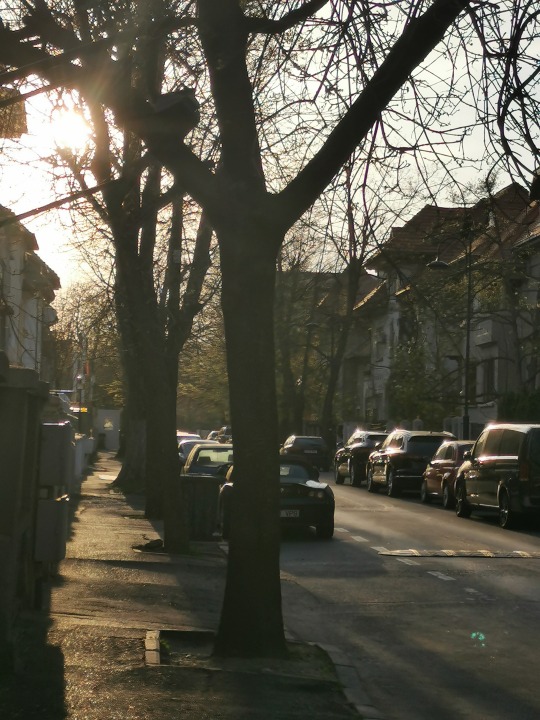
Ladies and gentleman, we are, on April 4th, 2020, in the middle of things. As the French philosophers, Gilles Deleuze and Felix Guattari, like to say, “be the rhizome,” not the root. In other words, don’t let the coronavirus be the start or end, but let it be the transformation vessel into something new.
A rhizome has no beginning or end; it is always in the middle, between things, interbeing, intermezzo. The tree is filiation, but the rhizome is alliance, uniquely alliance. The tree imposes the verb “to be,” but the fabric of the rhizome is the conjunction, “and…and…and…”
Whether that something new is good or bad is not for us to say. But I will say that things have needed to change for some time now. Let this be the conjunction towards something, anything, new and novel.
0 notes
Text
Coronavirus Haiku
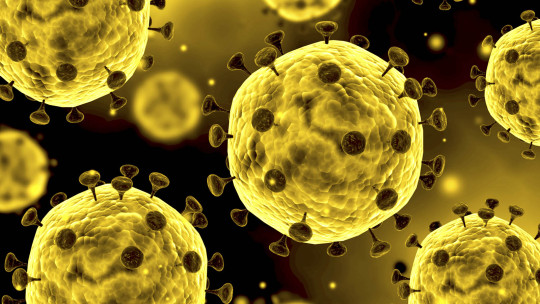
buy the last face mask,
wear it for four hours at mall—
shopping for Purell.
panic spreads faster
when you lie about the truth—
but that’s just a lie!
same as flu, only
more deadly times ten, twenty—
oh, you’ll be fine.
you worry about
catching the virus more than
catching the virus.
now is the time to
buy stocks in toilet paper—
NO wait, sell sell SELL !!!
stupid pandemics!
they come at you from all sides—
offer handshake, death.
1 note
·
View note
Text
The Year in Photos (2019)
The previous post was full of words. Here is the year in pictures, in chronological order. Hopefully it might fill in some of the gaps.

On the Black Sea beach, at Mamaia, Romania, in early January.

Skiing at the top of Bucegi Plateau, with Rita and Ani, in January.

Indication that you are in Eastern Europe at a ski resort.
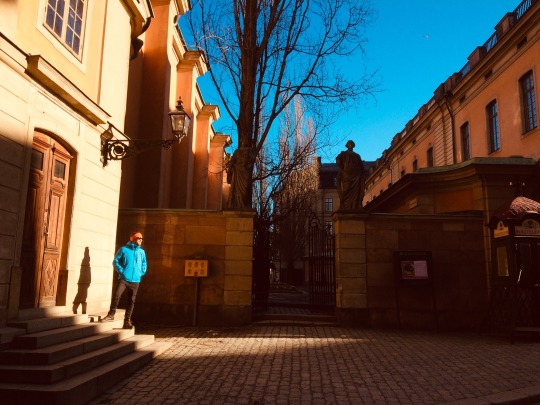
Sunny day in Stockholm, Sweden, in February.
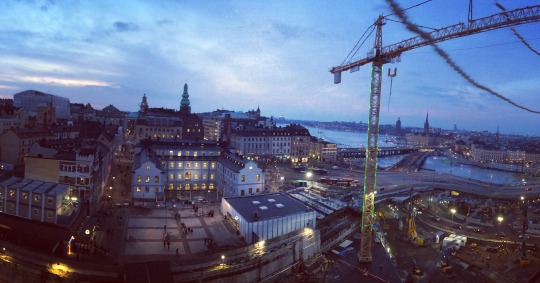
Stockholm.
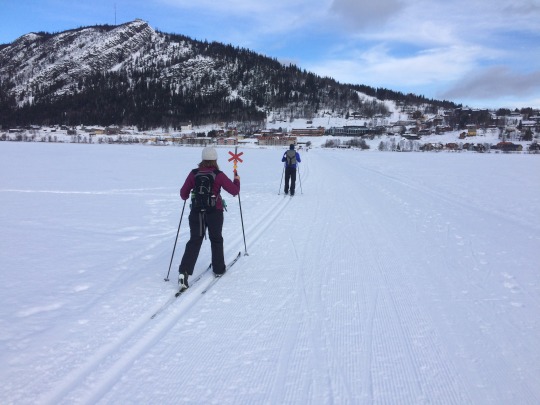
Cross-country skiing in Funasdalen, Sweden.
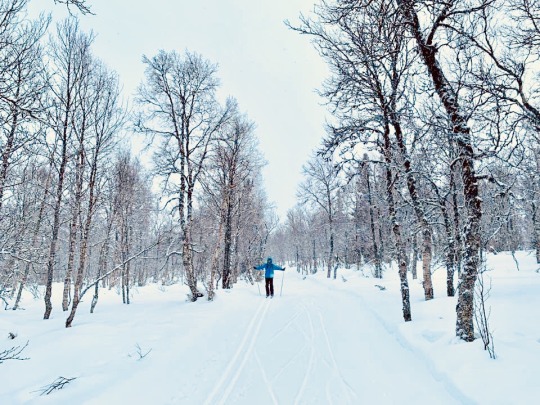
Arms wide open on the ski trail in Funasdalen, Sweden.
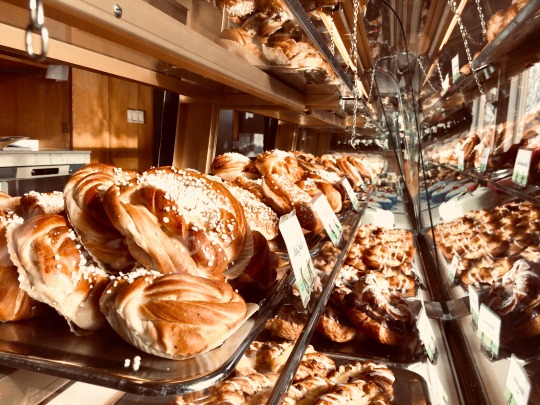
Yummy pastries in Uppsala, Sweden.
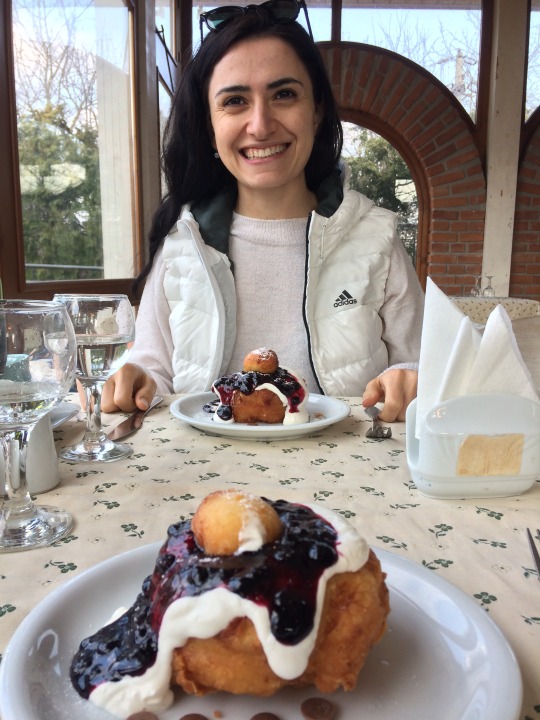
The quintessential Romanian dessert: papanasi. Apparently this is the “best papanasi” in Romania, according to Ani.
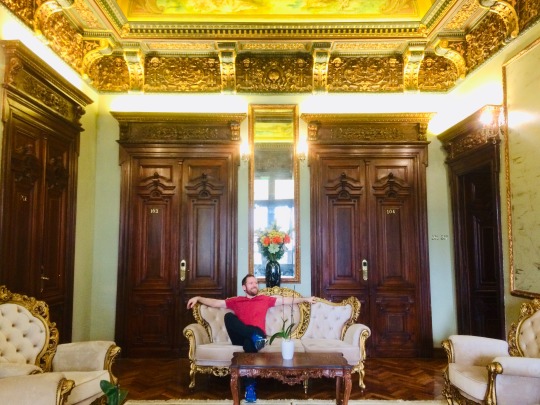
Kicking back at a high-class hotel in Craiova, Romania.
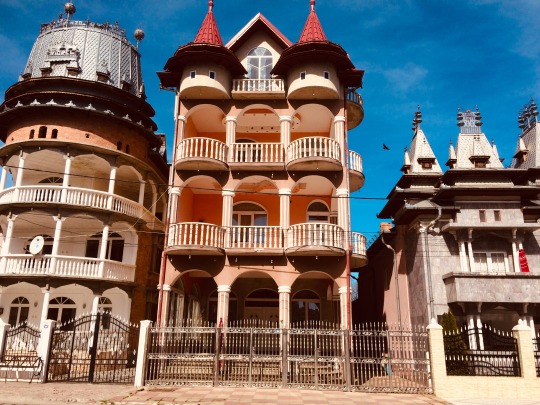
The Roma version of Champs-Elyssee, in a farming community 50 miles southwest of Bucharest.
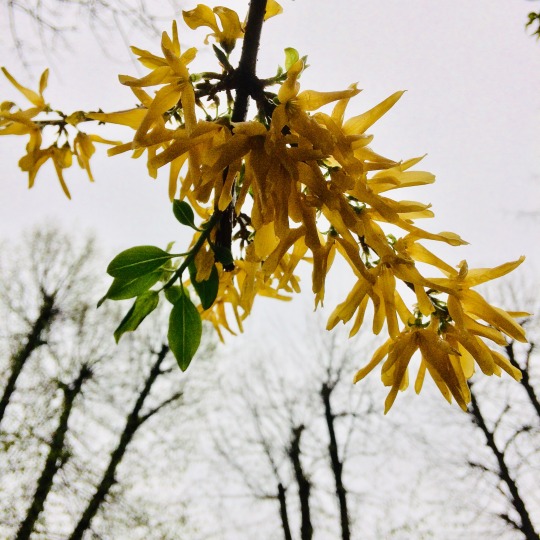
Spring is springing in Bucharest, late March.
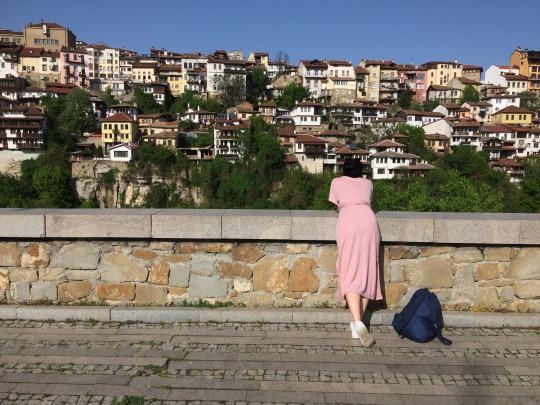
On Spring Break in Veliko Tarnovo, Bulgaria, in April.
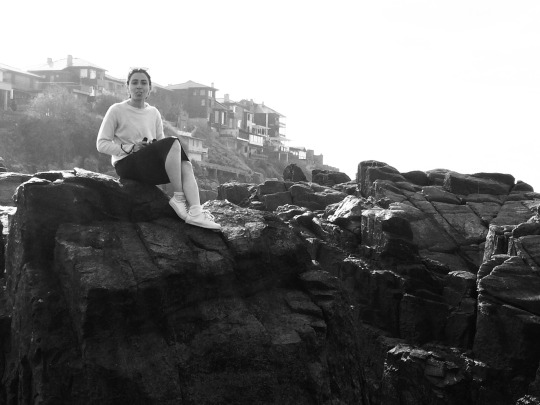
On the rocks in Sozopol, Bulgaria.
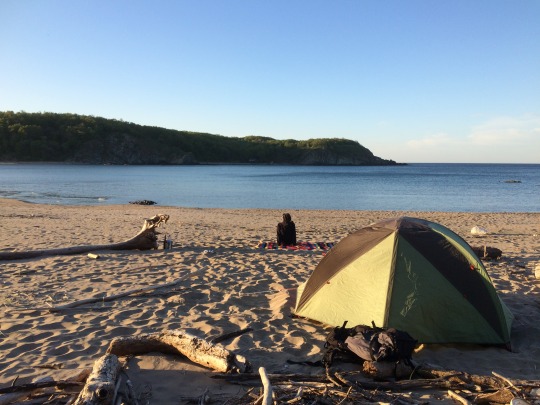
We had this beach on the far southeastern coast of Bulgaria all to ourselves.
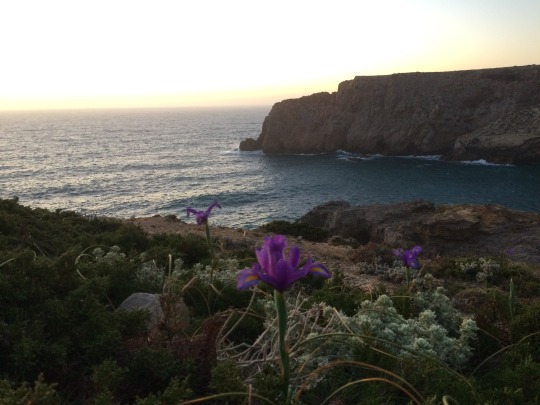
In Sagres, Portugal, at the approximate place where we hope to perform the wedding ceremony.
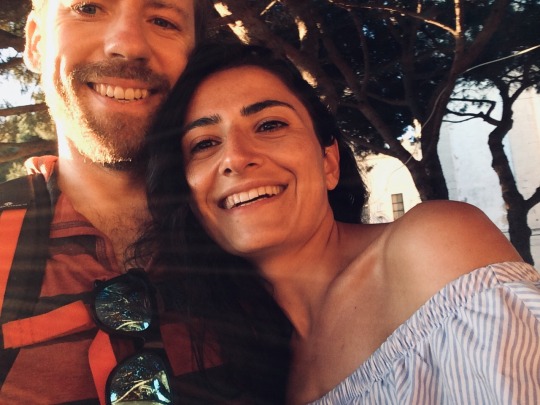
In Lisbon, Portugal, all smiles in May.
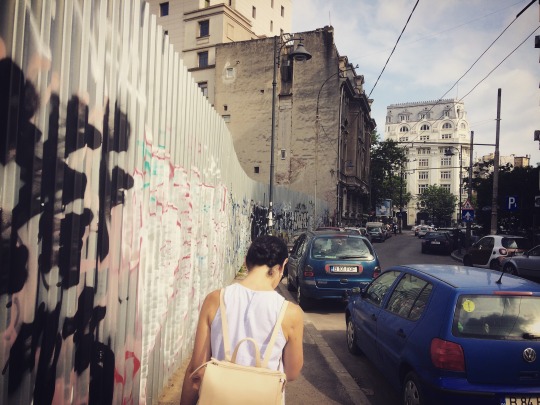
On one of many weekend walks through the streets of Bucharest.

Still Corners playing at Control Club in Bucharest.
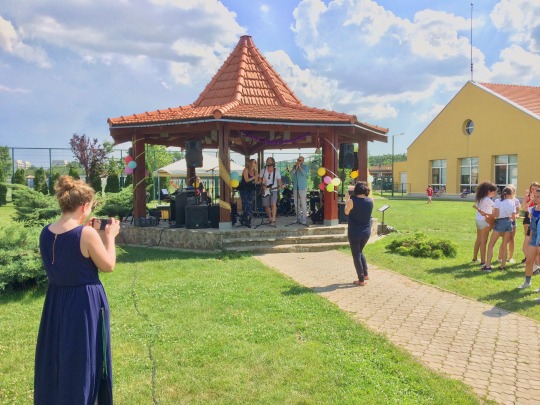
Good friends playing at my school’s “Rock in the Park” concert the final week of school before summer break.

Camping in the cold, on the high plains of Wyoming, with Jeff and Erica, in late June.
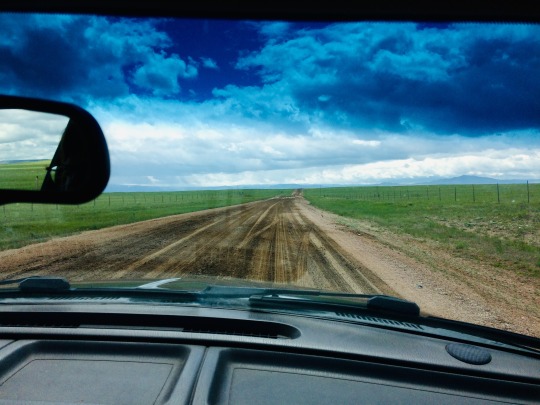
The High Plains of Laramie in June. I missed these views!
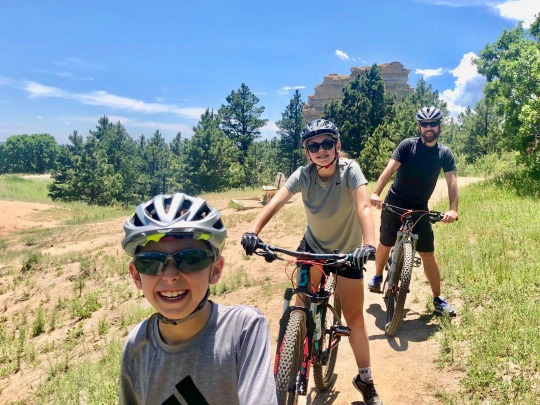
Mountain biking with the niece and nephew in Colorado, in July.
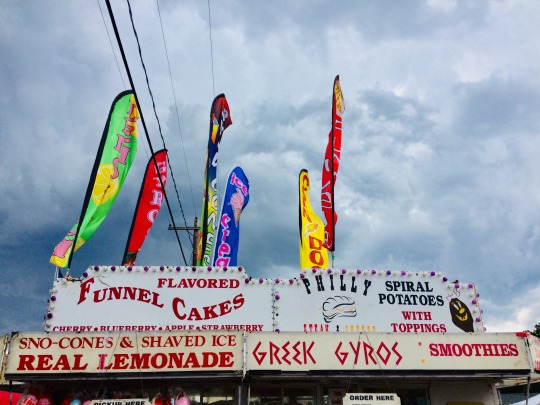
Funnel Cakes moments before a massive T-storm hit, on the 4th of July in Monument, Colorado.
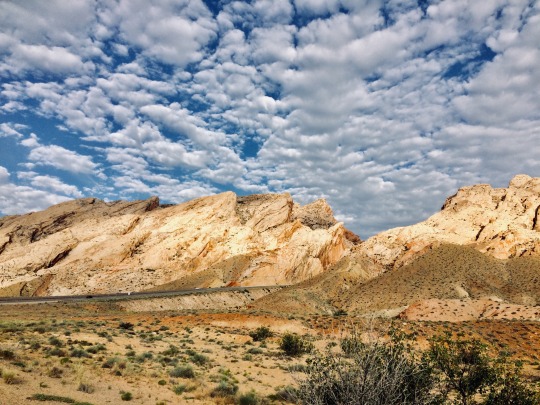
Utah views on the road to Oregon with my brother, in July.

The Beehive Kilns of Frisco, Utah.

Camping out in the sage of Nevada, along Highway 50, the “loneliest road” in the lower 48.
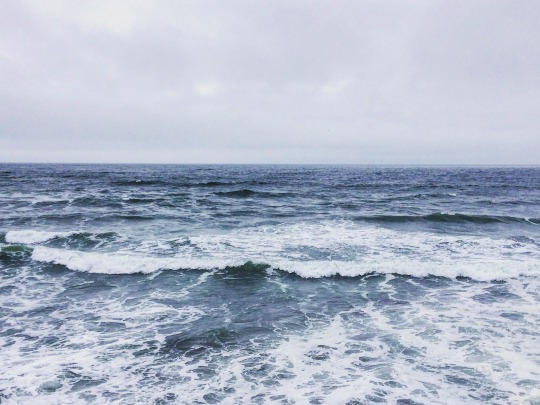
A stormy Pacific Ocean. In July, no less.
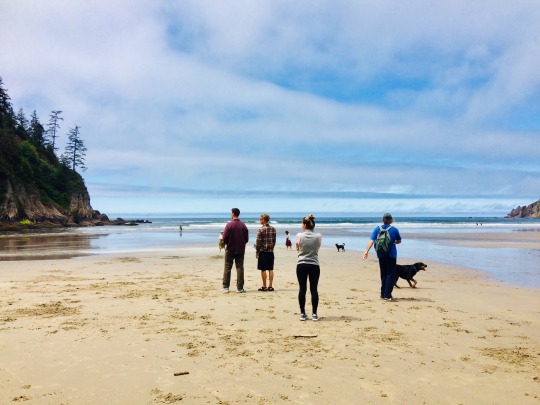
Oswald West State Park, with family, in July.

Spruce Run State Park, during that twilight hour when the sun dips behind the mountains, and the campfires start to roar to life.
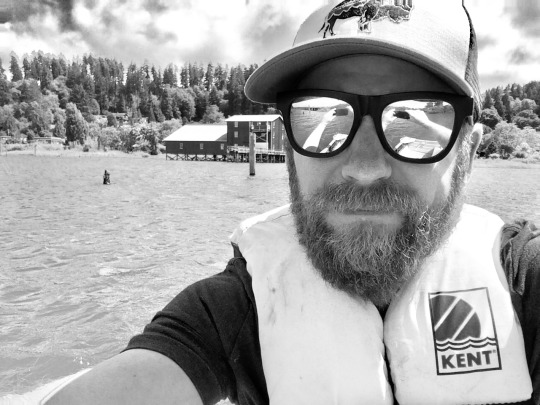
Took the boat on a paddle with my Dad in Alderbrook slough. Astoria, mid-July.
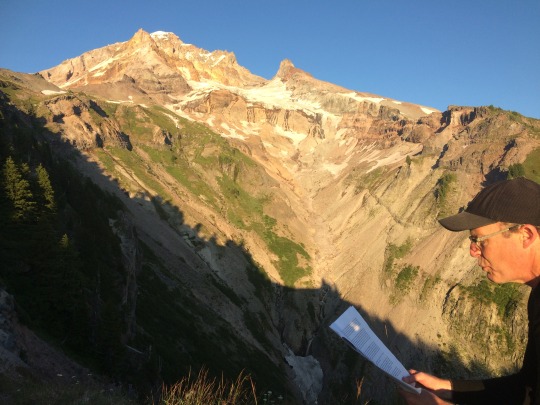
John reading a draft of his manuscript out loud at our camp on Mt. Hood. Late July.

Walking the ridge-line of the Piatra Crauliui mountains, with the Duke of Edinburgh expedition students. Late August.

Emergine from the Libyan Sea, on the south coast of Crete, a few hours before I proposed to Ani.
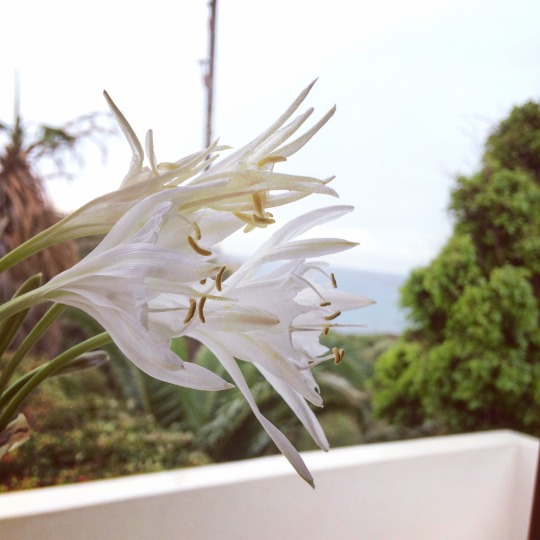
Sea Daffodils, picked on the day of our engagement, in Preveli, Crete, Greece.
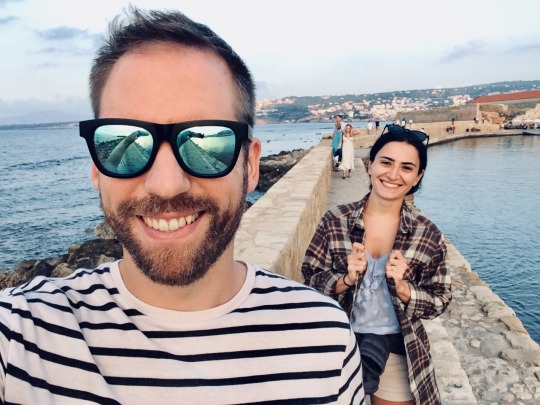
Evening stroll in Chania, Greece.

Coffee date at Origo, on the anniversary of our meet up for coffee.
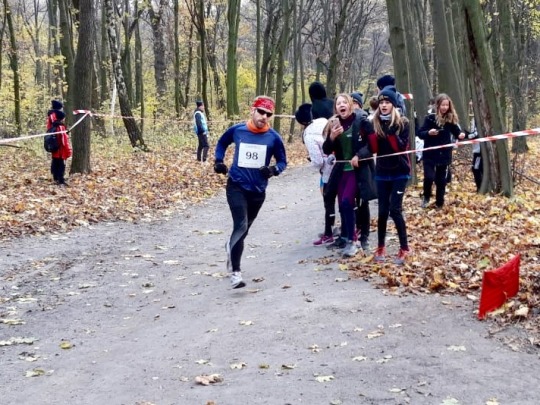
Taking the lead in the Coaches Run at the CEESA Cross Country Championships, in Kyiv, Ukraine. Before the end of the race I would get bit by a dog, but still finish the race in 3rd place.

Looking at where the dog statue is looking. At Peles Castle, in Sinaia, Romania.

Bucharest has been sunny nearly 90% of the time this fall and winter.
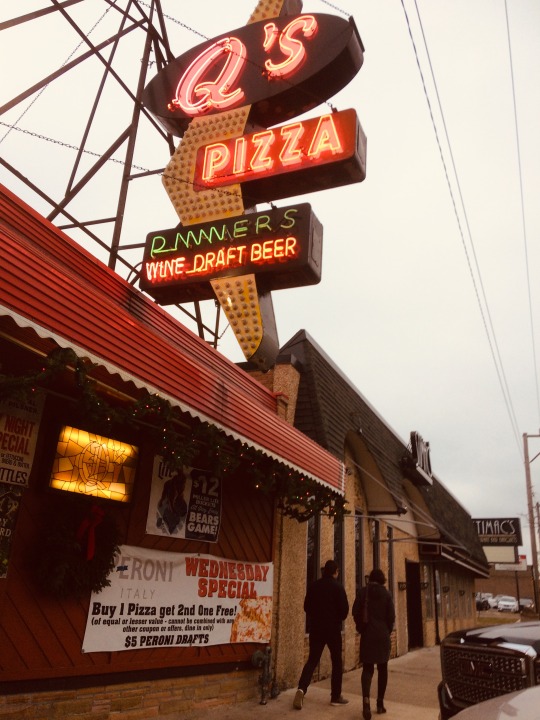
At Q’s Restaurant, famous for its Italian-American food, where the reception for my sister’s funeral was held. December 14, 2019.
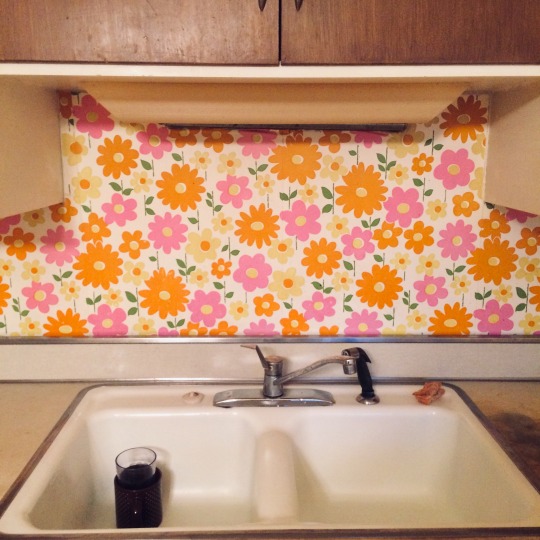
The wallpaper in the kitchen of my father’s family home of over 70 years, due to be sold in 2020.
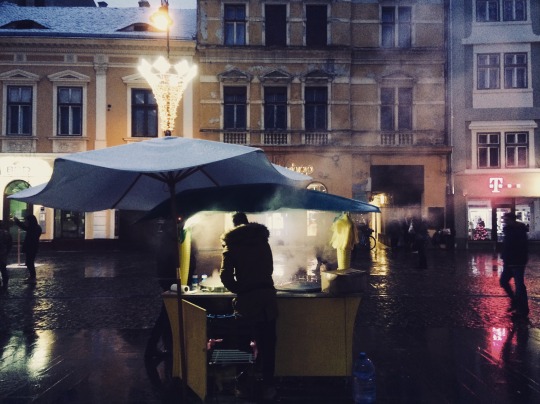
Selling steamed and grilled corn on the cob in Sibiu, a few days after Christmas.

All varieties of candy at Sibiu’s Christmas Market in late December.
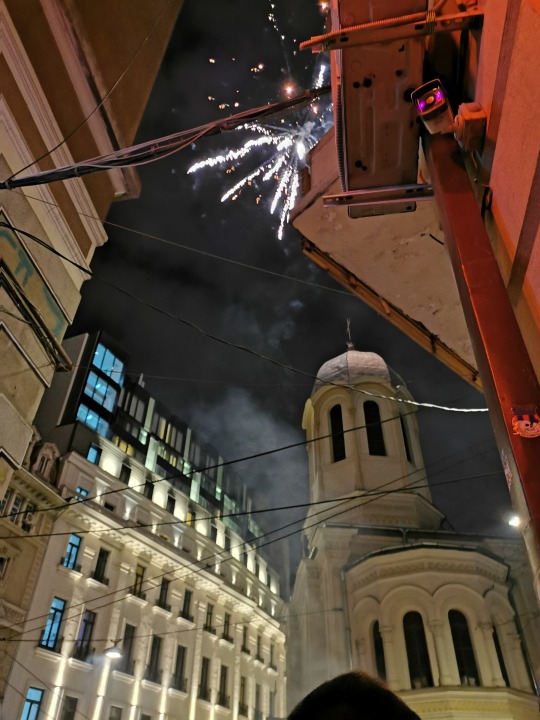
New Year’s Eve celebrations in downtown Bucharest, as it turned from 2019 to 2020.
0 notes
Text
The Fierce and Beautiful World: A Requiem for a Year
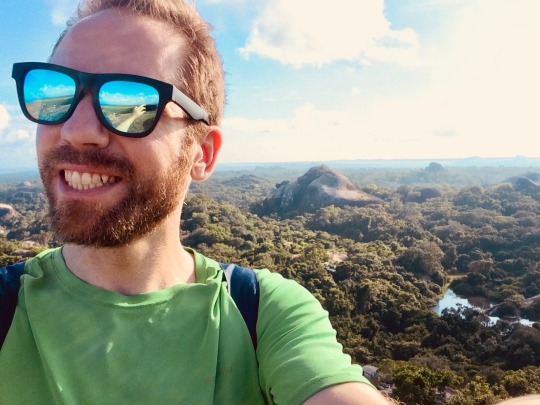
And now let us gather round the hearth—or whatever it is we consider a hearth in this day and age, be it a wood-stove (you lucky bums) or the soft glow of a smartphone screen—let us gather and dive into yet another of my long-winded rants and raves about the past year. For it has been a doozy. Is that the right word? Can a doozy capture both the highest of highs, as well as the lowest of lows? Is there a better word? I have already googled “best word to describe a year of ups and downs” and google cannot adequately give answers.
Because there are no answers.
Last year I wrote that there are only “arcs and circuits and feedback loops, and they are always bending and flowing. Gaining and losing. Seeking a balance, that will never be perfect or purely balanced.” 2019 was the year that proved it.

SRI LANKA NEW YEAR
On the first day of 2019 I woke up in Bucharest after a long sleep, interrupted briefly by midnight fireworks in the piazza down the street. I had just returned from a two-week trip to Sri Lanka, which, if nothing else, allowed me time to reflect and consider where I was going. I had just begun dating Ani, an Armenian-born Russian citizen, earlier that fall, and she was back home in Russia for the holidays.
One year later, I will read this, from a book gifted to me by my brother: “I will find my way into new country that beckons me to take unexpected risks, which turn out not to be risks at all, but the next step.” And I realize this was what 2019, and pretty much all of the past decade, has been about. Unexpected risks turning into next steps.
In Sri Lanka, I sat on a beach and watched a daughter excitedly frolic in the waves with her dad, and I thought, Wouldn’t that be nice, too? I took surf lessons (“I need to impress my surfing girlfriend,” I told my instructor). I sat on a flat wooden raft and was pushed across a lake by a silent boatman, while I spied elephants on the far shore with my binoculars, tuning in to the steady splashes of water against the hull. I leaned out from the open door on a jungle train as it chugged through tea fields in the highlands from Ella to Kandy to Colombo, listening to a soundtrack of indie rock music on my mp3 player.
I read, months later, about the terrorist attacks in Colombo and thought about the wonderful people I had met who would likely suffer from less income this year.
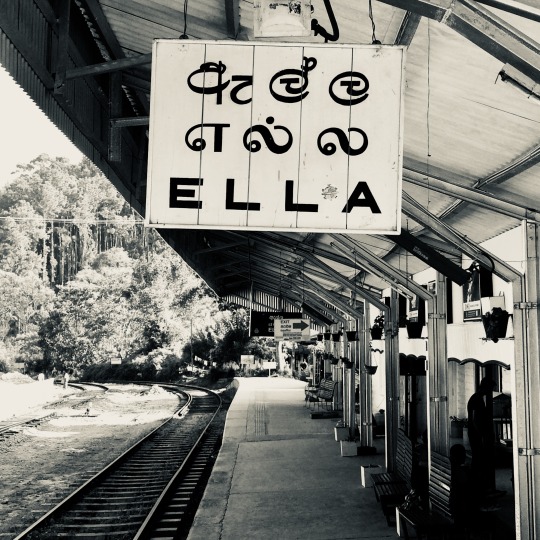
THE TROUBLE WITH ONLINE DATING
“Everything, even the weather, becomes a communication, or even a critical comment, on one’s relationship with things, phenomena, persons, etc.” I wrote that last year. It seems sad to admit, but the biggest comment about my newfound relationship with Ani came when I deleted all of my dating apps on my phone. Not days after I met her, nor even weeks. It took months. Months of internal conflict that culminated in what, for me, was a small victory for the soul.
Online dating apps have been both a blessing and a curse. On the one hand, they have allowed an introvert like me to actually have a dating life. I recall, back in 2007, when I was suddenly single after a long relationship, how difficult it was to date. I didn’t even have the Internet at my house in Eugene, Oregon; no Wi-Fi, and definitely no smartphone; I got 8 hours of screen-time per day at my job, and that was plenty for me, thank you. Dating in 2007 was like the Stone Ages compared to today, where you had to physically go out and “bump” into strangers, or just wait until strangers fell into your orbit.
I’m not really the kind of person who talks to strangers at bars (at least not in bars in my home country), so I let people drift into and out of my life like those deer who show up in your front yard, eating your clover, and then move on down the street. I was that kind of deer, too. A feral browser, moving to and fro, with no rhyme or reason.
And then, around mid-2016, voila! an endless scroll of possibilities with dating apps, whilst living in ever larger cities of Portland, and then Bucharest. But I noticed something: the “endless possibilities” became, for me, antithetical to actual committed relationships. I remember going on a few dates with women, who were, on balance, worth spending my time and energy with, but that energy was instead spent scrolling through the endless possibilities still out there. It was like I was living through some bizarro world version of my college art film, “Hunting Love.” I had become a hunter-gatherer, and yet I wanted to be a farmer. These apps had turned me into a hypocritical monster. With so much wild game at my fingertips, there really was no rational reason to switch to cultivating a sustainable life with another person. I had resigned myself to eternal bachelorhood, and I was becoming more and more okay with this.
Then I met Ani.
And isn’t this how it typically happens? Someone defies all of your expectations, catching you unaware?
With Ani, our courtship (and yes, I insist on using that old-fashioned term) developed over the course of months, not days. It was like a tree that needed to grow a few rings of thickness before it knew it was something of substance. In the past, I would have looked at the seed, imagining I saw a tree, prematurely. Often I would have planted anew before even giving it a chance to grow.
For me, the seed became a tree when we both took a weekend trip to the Black Sea coast in late January 2019, a full 2.5 months after we met. We got a deal on a room at one of the few seaside resorts still open in the dead of winter, one that had an indoor pool and a sauna. That evening, before dinner, we took a stroll along a desolate stretch of beach. It was dusky, cold, and a light rain fell, coating us in those fine white dots of spray. I remember thinking, “There are only so many people on this Earth who would actually enjoy what we are doing right now. I mean, it stinks like dying fish on this beach, and it’s bloody cold, and there is nobody else around here except us.” But we got closer, for warmth, and it was obvious I was not asking too much of her to be here with me.
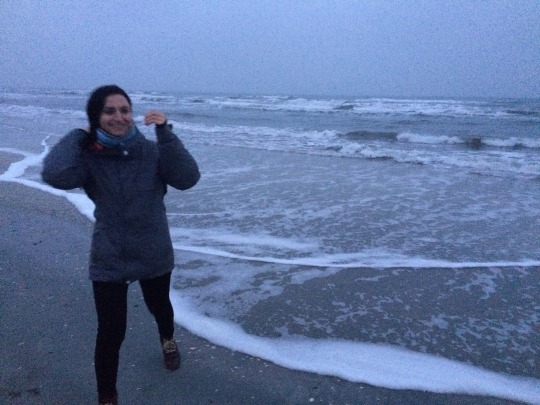
Later, in the spring, we took a weekend road trip to the far western part of Romania to scout a location for a school trip. Then, for a week we road-tripped through Bulgaria, with the highlight being some wild camping on a beach near the border with Turkey. Again, I came back from these trips pinching myself.
ADDRESSING THE ISSUE OF CHILDREN IN WAR ZONES
In the midst of all this, I continued to teach at the American International School of Bucharest, surrounded by intrepid and exasperating students, as well as adventurous colleagues.
For example, there was that wonderful week in February spent in Sweden with colleagues. We walked around Stockholm, then spent a solid few days cross-country skiing and soaking in hot tubs in Funasdalen, in the central-west mountains near the border with Norway. Mmmhmmmm, just what was needed in the middle of winter.
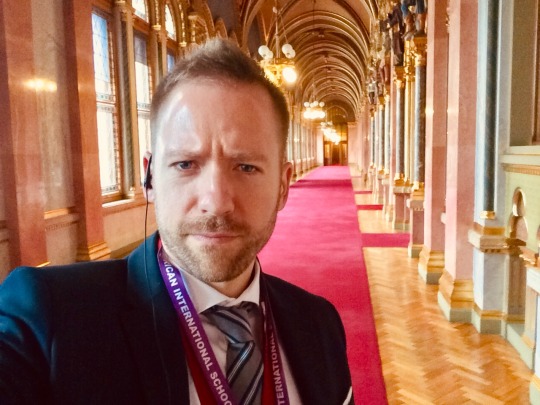
I also took on a new challenge this year, namely that I coached the middle school’s Model United Nations (MUN) for the winter season. We had a group of 8 students, all quirky in their own ways, who got practice in debating, resolution writing, and the fine art of lobbying. I’ll admit that I probably would not have been interested in MUN when I was a middle schooler, nor as a high schooler. It does seem to favor those who like to hear themselves talk, though it certainly attracts those with a desperate need for social skills practice. However, I liked that this was a group that actually enjoyed discussing worldly topics, like the role of NGOs in developing countries, or the role that religion plays in national politics. I was most comfortable when I could just assume the Humanities teacher role and guide students to a well-written and researched resolution addressing the issue of children living in war zones. We had a local, on-campus MUN conference in March, and then traveled to a MUN conference in Budapest, Hungary. The big news I wish to share is that, for the first time in my life, I bought a suit. Apparently MUN participants must dress the part, and their coaches must follow suit, literally. So there’s that. A small but significant change. Ka-ching.
THE POETRY OF BONFIRES
After MUN season wrapped up in early April, I got ready to lead a group of 7th and 8th graders on a trip to Port Cetate, in the far southwestern part of Romania, for a week-long creative writing and photography retreat. At my school, the 7th through 10th graders go on week-long trip in mid-May tailored to their interests. The trips ran the gamut from creative pursuits (like writing and photography), to outdoor pursuits (like rock-climbing, mountain biking, or scuba diving), to service-learning pursuits. On the trip I led, I got to teach kids about writing short, descriptive vignettes, as well as how to take photos manually using a DSL film camera (using my old Canon AE-1). It blew their minds that they would have to wait 2-4 weeks to see the fruits of their photography, most of which turned out slightly out of focus. Above all, I won’t forget the last day we had with the students, when we had a bonfire on the banks of the Danube River, looking across to Bulgaria. We had an impromptu dance party, which is probably the most memorable poetry these kids will remember a few years from now.
When we returned from this trip, I headed straight to the airport, to fly to Portugal to meet Ani in Sagres, where we spent two days surfing, eating amazing meals, swinging in hammocks, and hanging with her surf camp friends. We spent one sunset overlooking what can only be described as “the end of the world.” And others describe it this way, too. Sagres is the extreme southwestern point of the European continent. (It is at this spot that we hope to perform a small but special ceremony in June 2020.) Later, we drove north to spend a day in Lisbon, a wonderful city well worth the time and energy spent exploring its nooks and crannies.
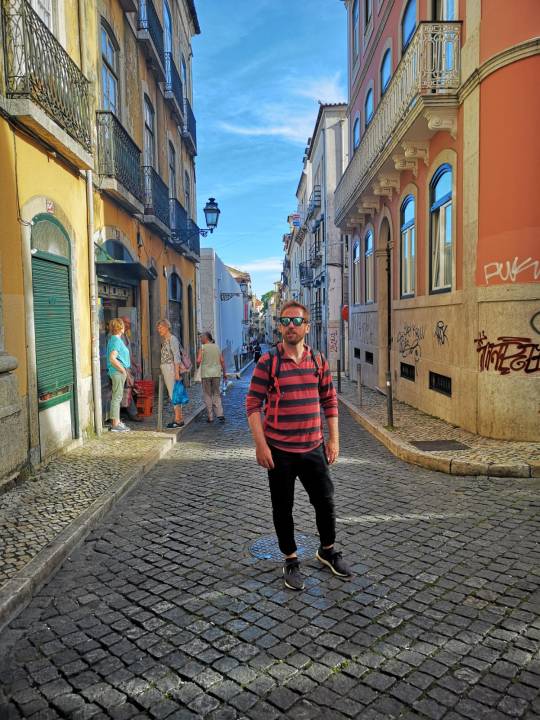
SUMMER OF HANG TIME
After that, time moved swiftly. The school year ended, and my summer break began. This summer I would not be charting something so adventurous as the previous summer’s month-long bike tour of the Balkans. No, this summer the theme was Hang Out with Friends and Family, and Renew Relationships. I think this summer epitomized what I wrote last year about optima:
“Optima means there is no single variable which should be maximized over any other single variable: period. This is the practice of stability, of optimization; an oscillation of gain and loss; the practice of diversity; the spirit of community.”
What this meant, in practical terms, is that my legs and lungs probably got less exercise this summer, but I was exercising something else, perhaps less physical, but no less important.

I spent quality time with friends and former professors in Laramie, Wyoming; a week with my brother Jonah and family in Colorado; a road trip across Hwy 50, the “loneliest road,” from Utah to Oregon, with my brother Phil; a family reunion in Astoria with my niece, Skye, and her fiancé, driving in from San Diego, as well as my sister, Elisha, and her boyfriend, Joe, flying in from Chicago, essentially to celebrate my return from abroad, as well as my niece’s recent engagement.
At first I anticipated this reunion with trepidation, as Elisha has a knack for returning to Astoria with hurricane force winds, knocking down everyone in her path of verbal volleys, usually snarky but occasionally biting. That being said, I hadn’t seen her in over a decade, for a variety of reasons, and I realized, after she arrived, in full hurricane mode, and saw her interactions with everyone, that I missed her. Her boyfriend, Joe, was sporting a mohawk and pounding down the local craft beers I was offering. Uh-oh, I thought. Maybe I should have mentioned these were 6% ABU? Somehow we all made it up to the Astoria Column for the sunset.
I remember waking up the next morning and seeing that nobody was taking action to make anything special for breakfast. Such lazy bums, I thought. Then I remembered that I was an adult now...it only took me 36 years to figure that out...and that if I wanted pancakes for breakfast, I had to make them myself. So I got out all the ingredients and I started churning out what we call “big pancakes” in my house, and which are called Swedish pancakes, or French crepes, elsewhere. Sure, there were arguments about whether my dad’s cherry jam would or would not cause food poisoning...arguments over the absurdity of my brother running out and buying three large jars of high fructose corn syrup jelly…but those arguments came from the parents. I remember that Elisha and Joe were grateful for my sweat over the stovetop.
This, I choose to remember.
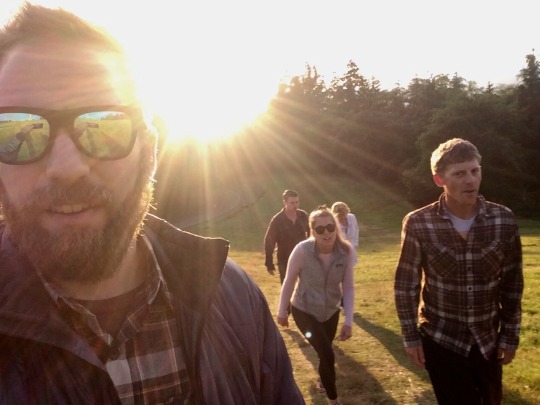
RECONNECTIONS
Later, once my extended family came and went, I focused on hanging with my parents, and spending time with friends in Astoria and Portland. On this trip alone, I met at least nine brand new humans under the age of two, such is the state of mid-30s life. At some point, I remember briefly thinking, “I miss the freedom of my bike tour of the previous summer, where every day I packed up my panniers and cast off on another journey to another new town.” Then I remember thinking, “Well, but this is nice. To reconnect and restore relationships...moreover, to have the blessing of time off in the summer months to do such a thing, is priceless. There will always be time for adventures; there is not always time to just hang out, however brief, and catch up on life.”
Indeed, I even got to spend a few hours with Ngaoi, a friend I met back when I was volunteering on a farm in New Zealand in 2010. She was the best friend of our hosts, and would come over often to hang out and help us in the hydroponic lettuce greenhouses. My ex-girlfriend, Rachel, and I secretly wanted to adopt her as our daughter (we were in our late 20s; she was in her late teens). Zoom ahead a decade, and she was visiting her current boyfriend, an American she met in New Zealand, but who happened to live in Beaverton, Oregon. They both made a weekend trip to Astoria, and I introduced them to the Blue Scorcher’s coffee and we browsed a “flea market” at a local church.
The sun races around the galaxy; the Earth sprints to keep up with it in gravitational orbits; and we always make our returns back to our origins to begin again.
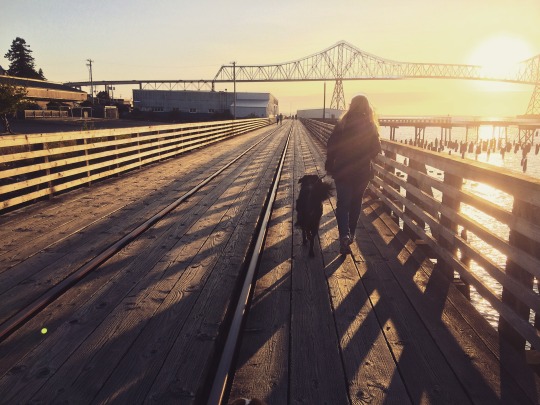
THE ORIGIN OF LOVE
When I flew back to Romania, Ani had moved into my apartment in downtown Bucharest. We had planned on it before I left, but still it was a bit of a shock to see all her belongings in place, the decor slightly personalized to her likings. I didn’t mind it at all. Moreover, it was an important milestone, a difference that made a difference.
When you are 22, you have your whole life ahead of you, and, even if you’re certain about a thing, can take your time to get around to ascertaining it. Well, when you’re 36, and you are certain about a thing, there is no practical use in waiting to ascertaining it. You take hold of it and don’t let it go.
Thus, by mid-October, while we Ani and I were on vacation in Greece, on the island of Crete, on a stretch of beach we had all to ourselves, as the sun hung low on the horizon, I proposed.
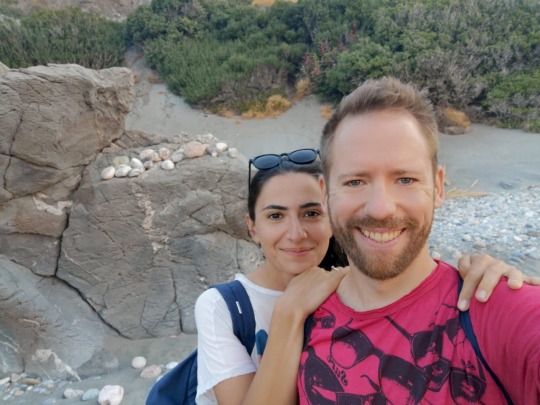
The engagement ring has the words “origo amare” engraved on the inside of the band, an allusion to our first meeting at a coffee shop named Origo. The Latin phrase means, “The origin of love.” It seems ironic, I know, that the origin of love could be instigated by a few messages sent back and forth on Internations, a social media site for expatriates, followed by a meeting for coffee. There was no love at first sight. In fact, it took a month before we exchanged our first kiss. But every slow burn needs its spark.
Our spark came when I asked if Ani would show me how to use her longboard, which she had in the trunk of her car parked a block away. As we walked to the concrete slab, she pushed me from behind to see which foot was more dominant. It was just a test, but later, she told me, “You felt so warm.” Perhaps the body knows things before the brain does. Life is a mystery, and I want to hold onto that mystery, because there is no reason we should have met each other, growing up on opposite sides of the world, to meet under such particular circumstances. That spark led to another meeting, and then another...
So it goes.
One year later we were engaged. Unlike most other times in my life, there is no inner conflict, no hesitation. Sure, there are “What if…?” lines of inquiry, as per usual. But the one line of inquiry that sets me straight is the one that goes, “What if I had never met Ani?” It sets me straight because I know the answer to that one: I would be writing this end-of-year review as per usual, likely on a tropical beach somewhere, likely alone, and happy enough, because I am perfectly fine enjoying my own company (and the company of books), and I would be describing some incredible moments from the past year.
But I would not be describing what I suppose I’m describing now: a change in trajectory, a revolution of priorities. Without Ani I would have been happy; with Ani I know I will be happier.
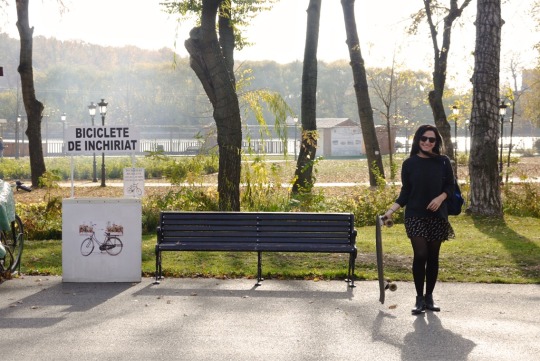
OF LOGISTICS AND A DOG BITE
So the year beat on. In November, I brought my cross country team to the championships in Kiev, Ukraine, and got bit by an unclaimed dog in the middle of the coaches race. Spent my November getting injections of rabies vaccine by a no-nonsense nurse at the Anti-Rabic Clinic here in the city.
We enjoyed a three-day weekend at the end of November in Milan, Italy, visiting with an old friend and taking engagement photos with an iPhone X. I celebrated my 37th birthday on a rare sunny day in Milan, eating turkey at a belated Thanksgiving Day feast.
Throughout the fall, Ani and I spent many an evening planning the logistics of when and where we would get married in Romania (in front of the legal authorities) and in Sagres, Portugal (in front of family), as well as the insane amount of bureaucratic paperwork needed to fulfill the requirements here in Romania.
Ani and I have no plans to return to the United States to “settle down.” We met as global citizens of the world, and we intend to stay that way, at least for the time being. As of today, I have spent a little over 5 years of my adult life living abroad, in places all over the world. I feel at home in the world now, and building a cross-cultural, multi-lingual family seems to be my ultimate fate, happily.
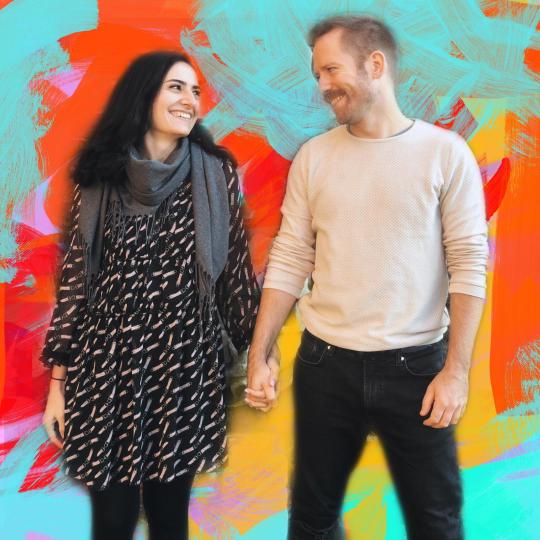
THE REBALANCING OF HIGH & LOW
Well, so much for the highs. Sometime in September, I thought, “I’ve been lucky so far, because I have only lost my grandparents, and that was long ago. But...it’s only a matter of time.” And that time came in early October, with the passing of my Uncle Remi. He was 76 years old. My parents flew to Chicago to attend his funeral, as well as take care of his final arrangements. He was living in his family home at the time, and now that house, which had been in my family’s possession for over 70 years, will be up for sale.

Then, on the evening of December 7th, I got a call from my brother. I was in the middle of my school’s holiday party, at the Marriott Hotel, when he told me our sister had passed away. She was 47 years old. At one point, he mentioned that we knew this moment would come eventually, and I knew what he meant. In 2011 she had nearly died as a result of a critical MRSA infection. At that time I was in a far remote corner of Ethiopia, and the power and Internet was cut. My family was rushing to the hospital in Chicago, and I was rushing to catch a bus to somewhere with a phone signal. She miraculously recovered from that scary episode, and so I like to think that she was blessed with eight more years of life. Eight more years to make memories with her daughter, and to see her daughter get married on a beach in Hawaii this past October, so happy and joyful.
After the news, I sucked it in as best as I could and went to work for three more days. Some colleagues wondered why I was at work. Where else would I be, I thought, on the couch moping? No, it was better to see the faces of my students, to let them know what happened, so they saw me as a frail human. And they were so kind about it. About seven students from my 6th grade English class even surprised me with kind notes attached to my door, reminding me of the spirit of giving and generosity in our darkest month of December.
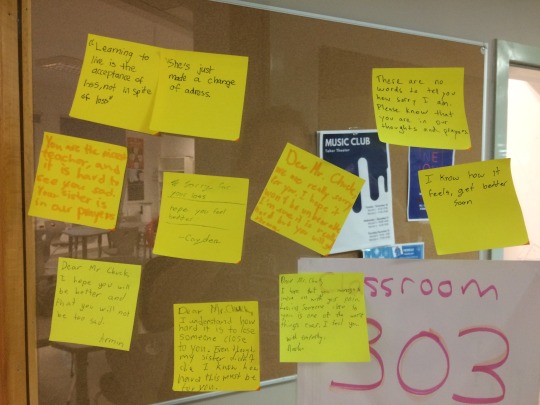
I flew to Chicago on a Thursday, arriving late, hosted by my cousin Jeremy. Despite the circumstances, it was satisfying to catch up with some of my family still living in Chicago, such as my cousins Jeremy, Harmony, Mike, and uncles Steve, Ben, and John, and aunts Linda, Pam, and Kathy. As well, meeting my cousins’ tiny children for the first time was a diamond in the rough.
The night before the funeral, my brother Jonah, his wife LuAnne, and my brother Phil, all of whom just arrived by air, picked me up from my cousin’s house. We congregated at the Hampton Inn, in Lisle, Illinois, where several folks were staying for the weekend, to put together three large photo-collages that would be displayed at the funeral. Elisha’s step-sister, Melissa, had collected arts and crafts supplies from the daycare she runs, and we all got to work, including my niece Skye and her husband, David. Together, we all did our best to piece together Elisha’s life from images collected from several sources across the ages. It was hard not to dwell too long on this treasure trove of images, some of which we had never seen until now, and before too long it was nearly midnight.
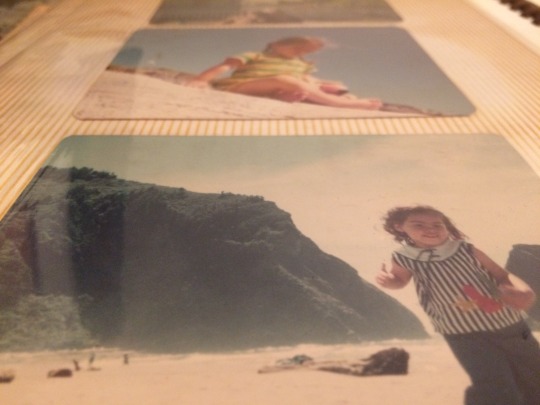
What is there to say about funerals?
Are they really for the deceased?
Or are they for the living?
As family and friends came together at the funeral home for a two-hour moment in time, we paid our respects to Elisha, and we paid our respects to each other. I met people for the first time, and I reunited with people I had only met once, long ago. The photo-collages were beautiful, but it was the photo album that my Uncle Steve brought—ones that held Elisha’s baby photos, when she ran and frolicked on the farms and coastal beaches of Oregon—that choked me up the most.
Every time I got near my sister’s urn I choked back tears. Stupid as it sounds, because I didn’t have any tissue on hand, I stifled the tears. But when the funeral parlor director came out to ask everyone to take a seat, or take a knee, while he said a prayer, I found some tissues, and the tears burst forth.
Then he asked everyone except the immediate family to walk past the urn and pay their final respects. I did not, could not, look up. More tears.
Then he asked the immediate family to come forward. We made a half-circle in front of the urn, in all its rainbow-hued splendor, reflecting my sister’s colorful character, sitting there amidst the expensive floral arrangement paid for by my Uncle Steve (“For these types of things you call the professionals”). More tears from me—and the funeral director told what amounted to an anecdote about his own mother’s passing as a way to lighten the mood. Later, Jonah would ask, “You think he tells the same story at every funeral?”
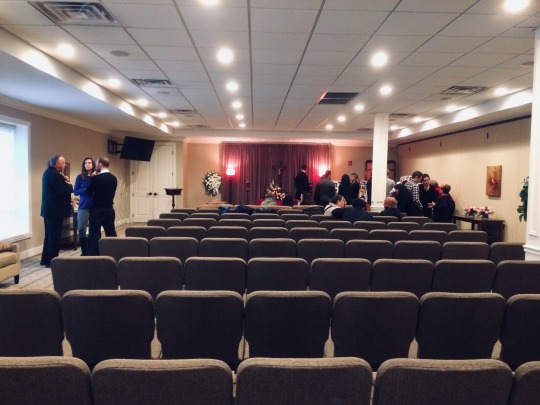
He probably does tell the same story. Because it’s always the same story. Loss is loss. Grief is grief. He can tell us all about how it will only be “a little while—hopefully not too soon! (haha)” before we see our loved one again in the metaphysical afterlife, but, believers or non-believers, it does not take away the pain of the present moment.
Even so, the funeral was over, and it was time to pack up the cars full of flowers and photo albums and an urn, and head over to Q’s for the reception, where the menu was Italian-American to the max, including what my vegetarian brother described, accurately, as a “meat salad.”
The remainder of the days in Chicago were for hanging out. Being together. One-by-one, people flew home, and I stayed until Tuesday so that this “hanging out” would not be rushed. My cousin Jeremy took Friday and Monday off work, as far as I could tell, just to hang out with me. In many ways, this trip was an extension of my summer trip back to the U.S. No matter how far I fling myself out in the world, the Great Magnet always reels me in, back to Chicago, back to Oregon, back to the Rocky Mountain West, back to the Pacific Ocean, back to Doug fir trees, sand dunes, and the coastal river valleys, where campfire smoke always drifts downwind, and where an ageless youth laughs out loud, in a cackle, at the glee and sheer terror of catching a crawdad.

CHRISTMAS SPIRIT
The final half of December I spent with Ani as we celebrated the Christmas spirit at three locations throughout Transylvania, in Romania, each place unique. The first place, Sinaia, is known for its mountain peaks on all sides. We intended to go skiing, but the snow report stunk, so we went hiking instead. Then we moved on to Cund, a small, quiet village in what is known as the Saxon part of Romania, a place with a strong German heritage, and fortified churches. We sat by a roasting wood-stove, watched movies, and went on a meandering ridge-line hike in the mist. Finally we moved on to Sibiu, a small city that resembles a storybook German village than anything you typically find in Romania. They have one of the largest Christmas Markets in Eastern Europe, and it is exquisitely framed by a picture-postcard square, with buildings that have droopy eyelid windows in the roof, so it looks like you are being watched.
And, who knows, maybe we are being watched over.
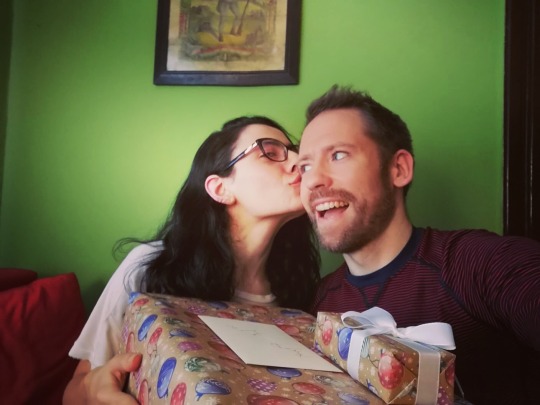
There is much to be thankful for in the year 2019. For me, a solid job I am passionate about, a fiancée who sticks by my side through thick and thin, and the good health to still run my legs through the forest at a fast speed, rabid dogs notwithstanding.
There is so much to look forward to in 2020, up to and including:
In February, travel to Ethiopia, with a group of five other colleagues
In March, Ani’s cousin’s wedding, in Togliatti, Russia
In April, travel to Armenia, to visit my newly adopted motherland
In June, our family wedding in Sagres, Portugal
In July, a possible bike tour :))
I welcome this new decade, like a new chapter, with open arms.
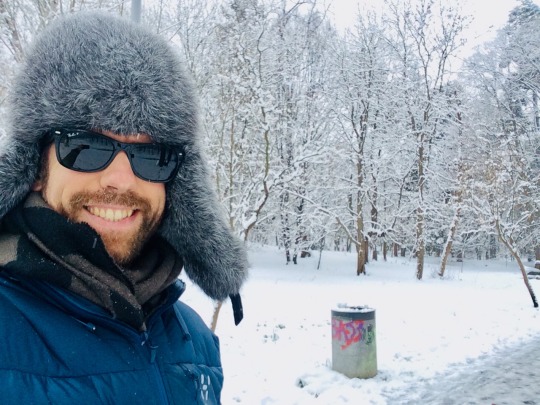
0 notes
Text
2D Animations (circa 2005)
So...at one point in time I took a 2D animation class in undergrad as part of my BA in Studio Art. I enjoyed it, though it is difficult to say what “skill” I learned by the end of the course. Maybe it was telling pre-Vine and pre-TikTok micro-loop stories? Maybe it was just the fulfillment of a lifetime dream to animate, even if some of it included a little blood, gore, and physics.
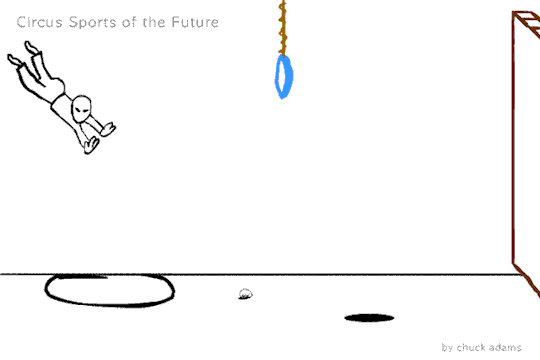

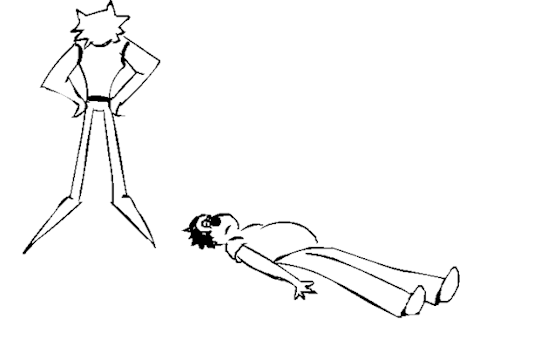

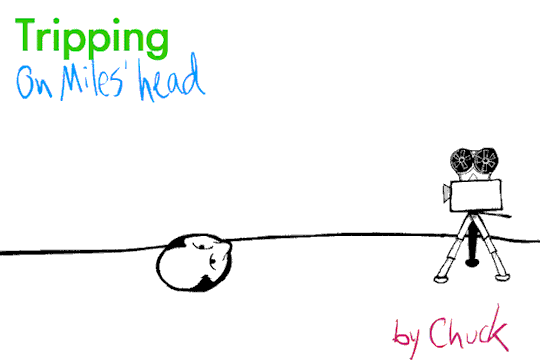

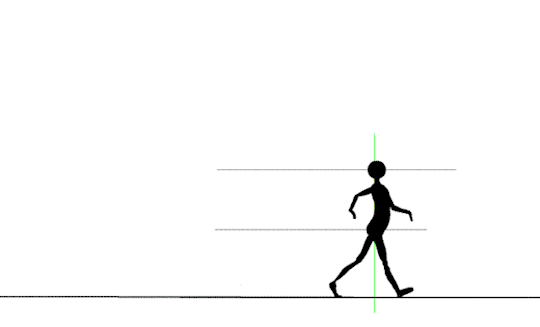
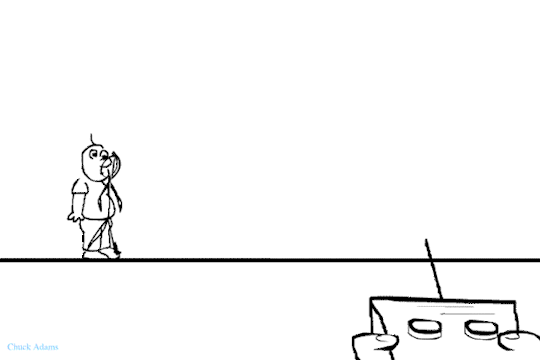
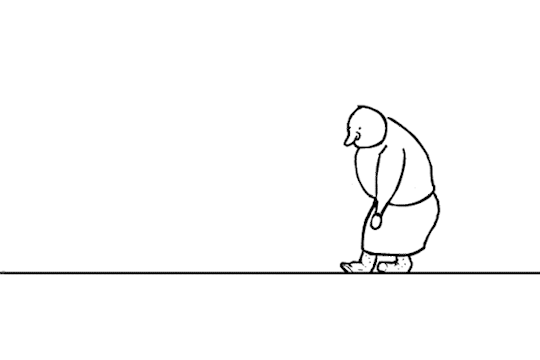

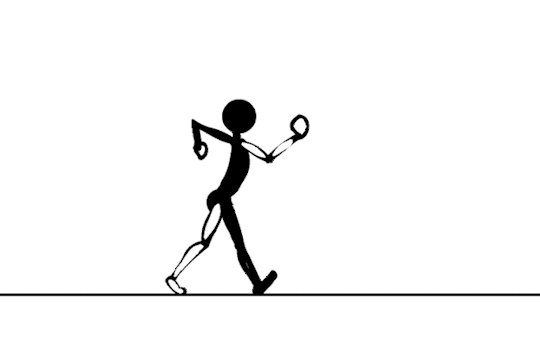
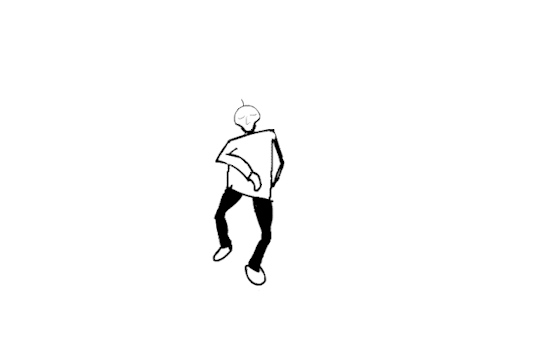
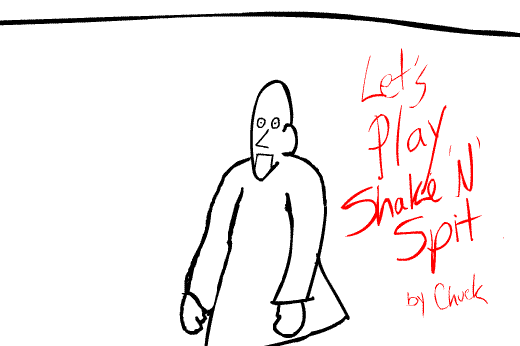
0 notes
Text
The Purple Scarf (a short story)
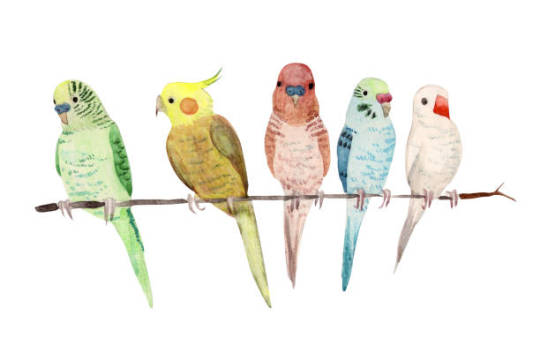
I imagine that I am the one who must talk the woman down. I see it, and it happens like this:
I tell the woman about a recent novel I read, one in which a woman was on a ledge, ready to jump, and I tell her that the woman in the novel didn't jump, and there was a heroic cheer when she didn't jump, and she was saved by the friendly bystander, but that later, months later, she swallowed a toxic combination of pills, and killed herself anyway.
My point, I tell the woman, is that there are deep problems to these kinds of decisions, and the heroes of our society never stop to ask where the root causes of the problem lies.
So, I say, what's your problem?
The woman adjusts her seated position slightly, takes a deep breath, and nods at the green parakeet tip-toeing further along the ledge. "I just want Betty to come back," she says.
In that moment, Betty flies away. The woman slumps on the ledge.
The situation is precarious, and so I say, "What can we do about Betty?"
"We?" asks the woman. "When did this become a 'we' problem?"
"The moment I noticed your purple scarf," I say.
0 notes
Text
Old Friends (2019)
Hello, Mr. Chevy! Hello, Ms. Kia! Hi, Little Toyota! Howdy, Master Mitsubishi! As I jog through the places of my past, old friends pass me by―pause awkwardly at stopwalks― sit idle, tummies rumbling, but going nowhere. Hola, Senor Ford! Greetings, Mrs. Subaru! Pardon me, Sir Hummer, and thank you for not running me over, this time. I huff and I puff, these old roads challenging my knees for their inclines and declines. Pausing at a familiar corner, I say hello to Captain Robert Gray, my historic elementary school― now dormant district offices. Descending a small hill, I skirt around the backside of my alma mater and onto the track for an old-school loop. In the parking lot, dozens of cars parked― my friends are all here, but not a soul in sight. On my return journey, I stop at a small park. It is a Saturday in summer, but nobody is around, the monkey bars lonely for my grip. I grind out a few reps, my teeth gritting, the sinews of mid-30s bone and flab straining for rescue from this harshness of exposure. Then―thud thud thud―high overhead, the beating wings of my friend, the Coast Guard Jayhawk, waving down at me, and I am filled with peace and security knowing I will be safe the moment I am spirited away, inside the machine.
0 notes
Text
New Year’s Prayer (2019)

Ten years ago I woke up in my car on New Year’s Day. It was parked in a field at my friend Brooke’s house, when she lived in Forest Park, outside of Portland. We had just had a gathering of friends—old and new—for the NYE festivities. I am not exactly sure why I wandered out to my car at some two in the morning. I think I went to grab my sleeping bag and return to the house, but when I saw how personal and private the inside of my vehicle could be, I curled up inside and fell asleep.
I do like my private spaces. But there was no sense of lonerism on that night, nor on any of the hundreds of thousands of other nights I have been “alone”. The context of myself extends much farther than my skin, much farther than my car, and much farther than the field that my car was parked in. My dearest friends were less than 300 meters from me that night, but they could have been 3,000 miles. The context is greater than all of that. I can’t say, in all of my world travels, nearly all of them solo, that I have ever felt a debilitating sense of loneliness. This would only come about if I believed in the myth that my “self” ends at my skin. I do not believe this lie.
This year I pray for taking us all one step closer to an ecology of mind. By this I mean that we are all minds part of a larger Mind, and an ecology of ideas and relationships flows through all living things. (Yes, the Internet must be considered a part of this Mind, too, but distinctly only a part of this ecology.)
To do this, we must take steps towards optima instead of maxima. Optima means there is no single variable which should be maximized over any other single variable: period. This is the practice of stability, of optimization; an oscillation of gain and loss; the practice of diversity; the spirit of community.
Unfortunately we have made loss pathogenic, as if it is something unnatural and unlucky, a disease or some monstrous error that we will correct with the next Presidential election. We forget that gains are only possible by losses, and vice versa. And if you are only gaining, who is doing your losing for you? There is always someone else doing your losing for you, isn’t there?
A Northern California coastal forest does not prioritize the growth of Redwood trees. Thus, any attempt by humans to optimize the Redwood’s stability must fully address the ecological niches that can be seen, or unseen. Therefore the entirety of the landscape/environment/society must be looked after in careful stewardship.
This is the hardest thing for humankind to do, mostly because of conscious thought. We believe and are taught we are individuals, unique and one of a kind. We focus on ourselves, reading many a self-help book, and apply self-care and self-love. We seek to maximize our potential, to maximize our gains, to maximize our selves. The potential for monstrosity is so great amid all this. However, many of the systemic approaches towards this “maximization” is, actually, an “optimization”: instead of focusing on self-help, these saner methods focus on the relational health of your largest network or context of “self.”
What must be looked after are the relationships. Even while “alone” one projects these messages of relationship onto the environment and wider circles of society. Is it keeping up its end of the bargain? Does it please with its cool breezes or punish with its long days with relentless heat and not a cloud in the sky? Does it pass a law that will directly benefit me? Does it punish me with its Supreme Court nominee?
The question of frames is an apt one. To what frame are we giving our current situation? (E.g., Are we open to any and all random occurrences, and do we treat these events as gifts or curses?) Many wish to frame their circumstances and their environments in terms of these types of relationship. Look to any bride or groom in the weeks leading up to their outdoor wedding—reading the weather reports like it’s some kind of a message sent from God or some other Supreme Mind—the forecast for rain being an omen for negative long-term relationship. Bad luck! The actual day comes and sun bursts forth with a blue sky: Alas! God blesses our sacred union! Everything, even the weather, becomes a communication, or even a critical comment, on one’s relationship with things, phenomena, persons, etc.
Can there be a saner approach?
The Tao says, “Throw away morality and justice and people will do the right thing.” How could this be so? Because, in that case, we would then resemble the animal kingdom (to which we are a part)—no morals, no vengeance, no justice—but simply beings acting in response to our environments using our bodily intelligence. The “right thing” would be: the action the ecology requires us to take. No doubt this action would be a selfless one, even if it benefited ourselves directly.
Does the lion think, “By eating this gazelle I am protecting the grasslands from overgrazing”? No. All the lion is doing is what it is optimized to do. The gazelle is doing what it is optimized to do, too. Good and bad, right and wrong, morality and justice: none of these concepts apply in an ecology of mind.
Conscious purpose is always and ever a matter of disturbing the natural order. “Good” intentions often have led to horrifying ends. These “good” acts will always lead to outcomes both pleasant and disastrous. Which begs the question: Can there be a “right” course of action or decision? Or might that look like “non-action” or “considering fully; acting decisively”?
The Tao says practice non-doing, and everything will fall into place. This is practically the same advice given by systems theorists like Gregory Bateson. But even he didn’t know how to live with this “new” frame of mind. He still believed, like many of us still do, erroneously, that it is possible that “I see you,” forgetting that this is just language describing a mental phenomena.
Perhaps Martin Luther King Jr. was wrong. The arc of the moral universe is not bending towards justice. Because there is no moral universe. And there is no justice. But there are arcs and circuits and feedback loops, and they are always bending and flowing. Gaining and losing. Seeking a balance, that will never be perfect or purely balanced. So MLK was both right and wrong.
So many of us have a stake in perpetual gains (ahem, stock market and real estate portfolio…), even the most outspokenly green among us. And so we shoot our own foot, the one we need to use to balance on the high wire, and blame others for our downfall. This is the result of our maxima universe. Our neoliberal policies. Our “selfie” driven culture.
In 2019 I pray for the steps towards optima, not by acknowledging the inner self (which has gotten too much attention anyway), but by acknowledging the other I, the other you, the other us, the other selves. We are all in this together.
In this we pray.
1 note
·
View note
Video
"Work It Out 2018." Video by Chuck Adams, with choreography by Raoul Canavar. All of the video clips in this 2018 retrospective are in chronological order, for your general amusement and information. Please note that my Balkan Bike Tour video clips are not included here, and will comprise a separate video to be finalized soon. [If the above video does not have sound, try this link: https://vimeo.com/309165369]
0 notes